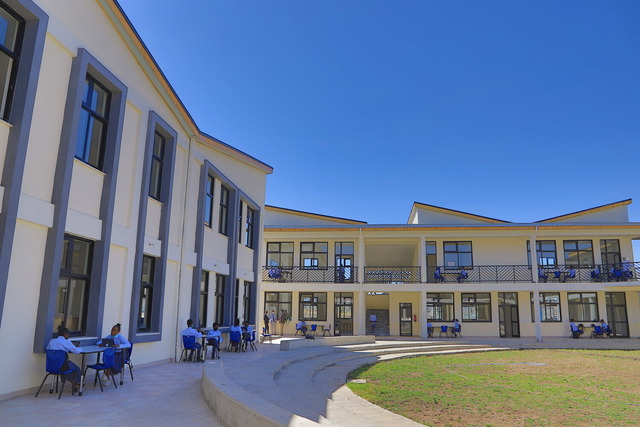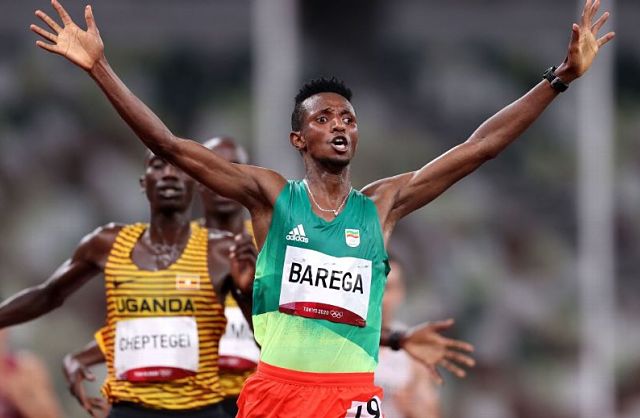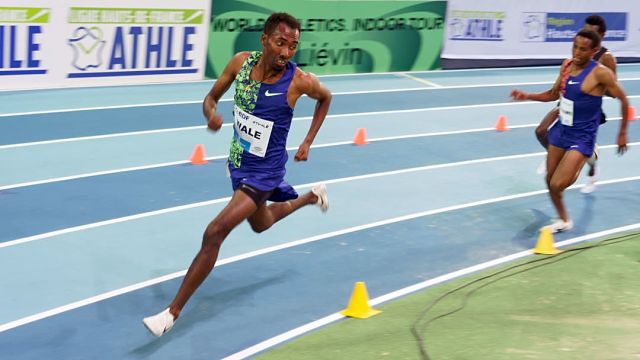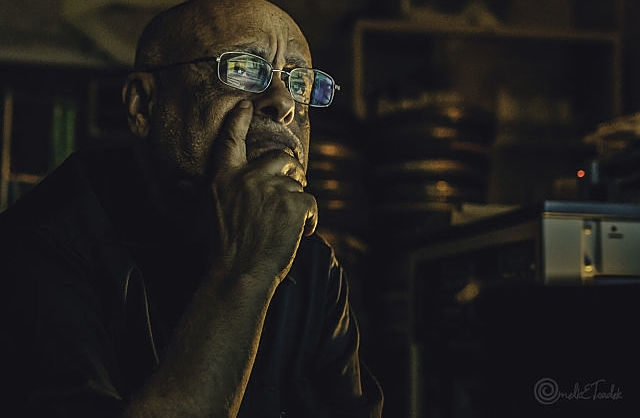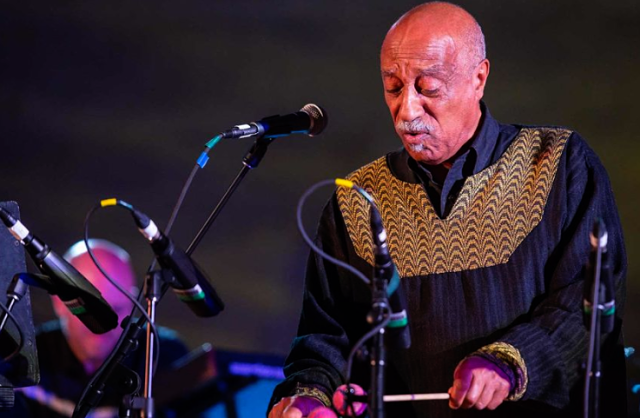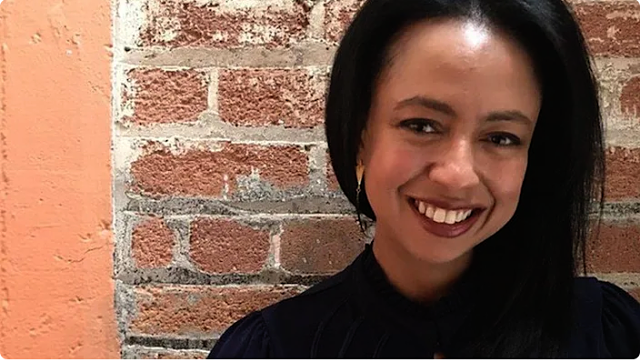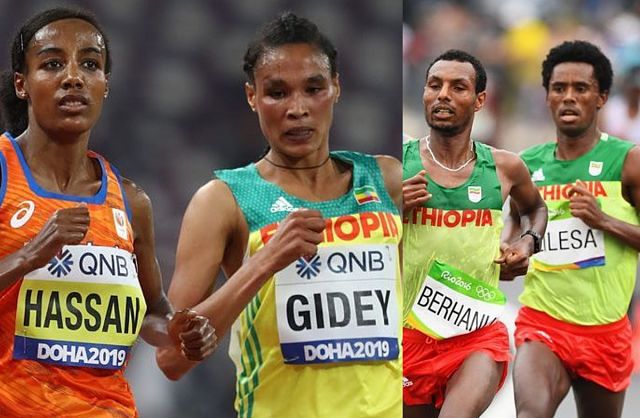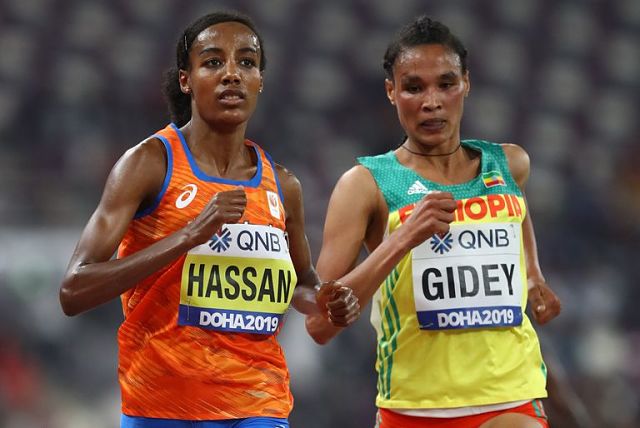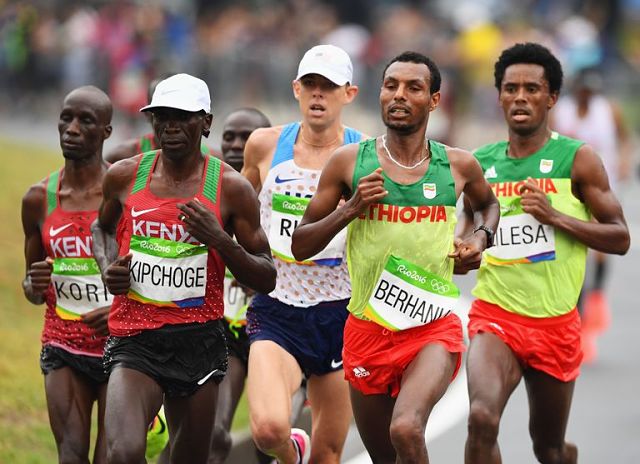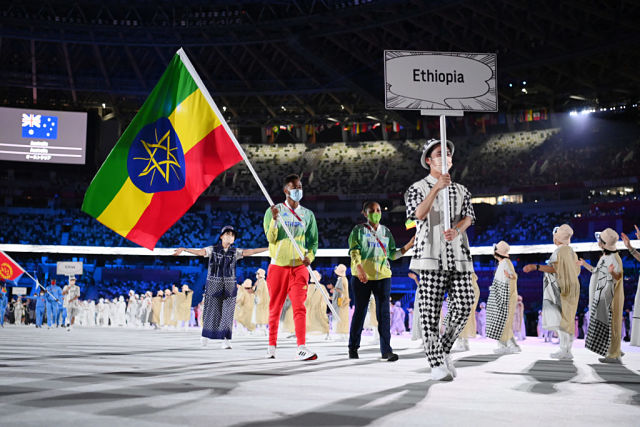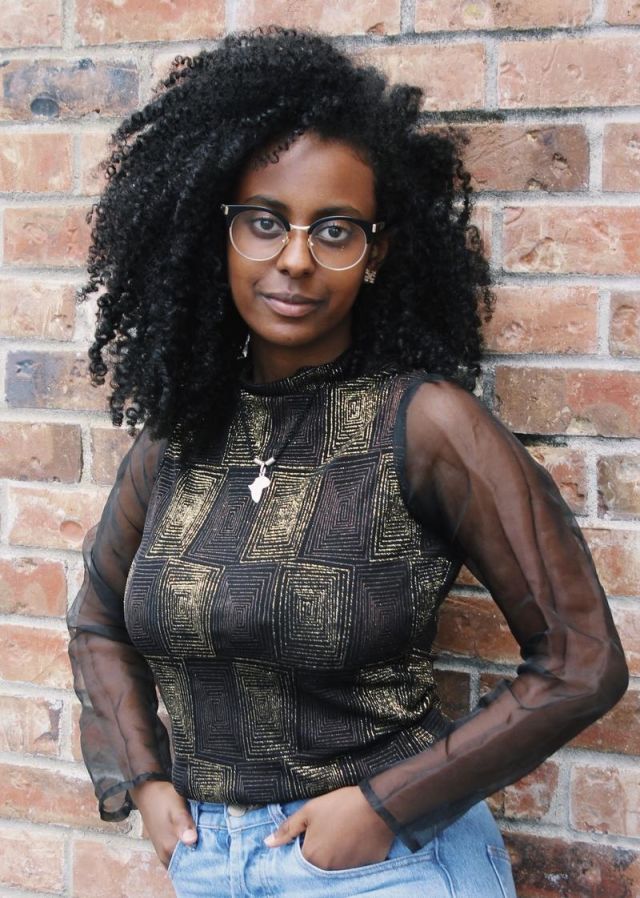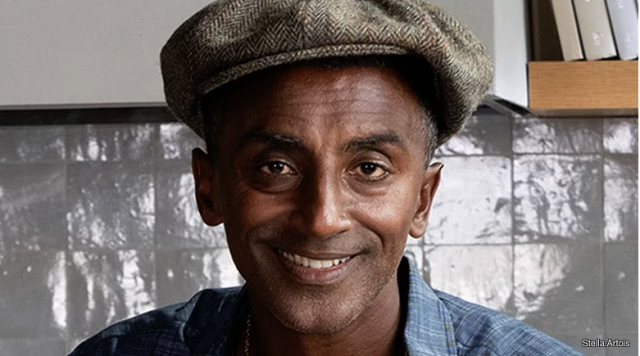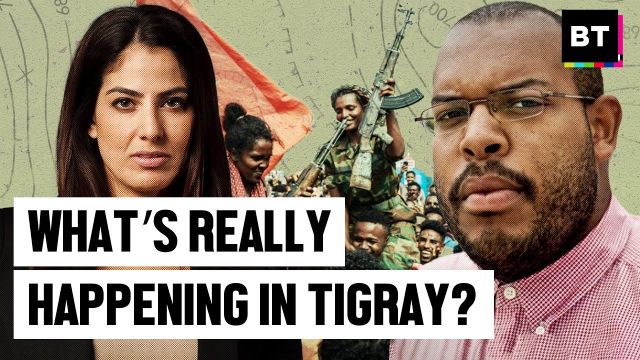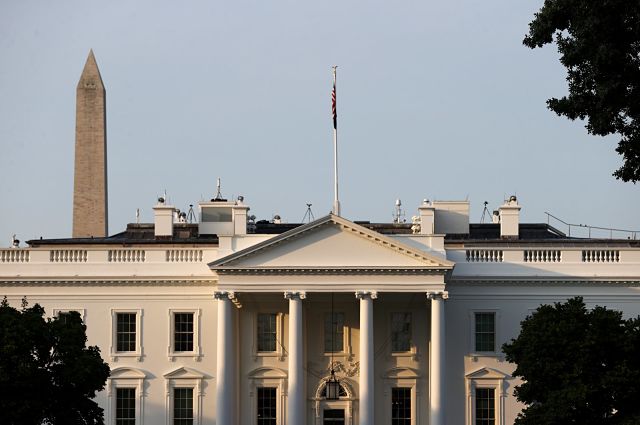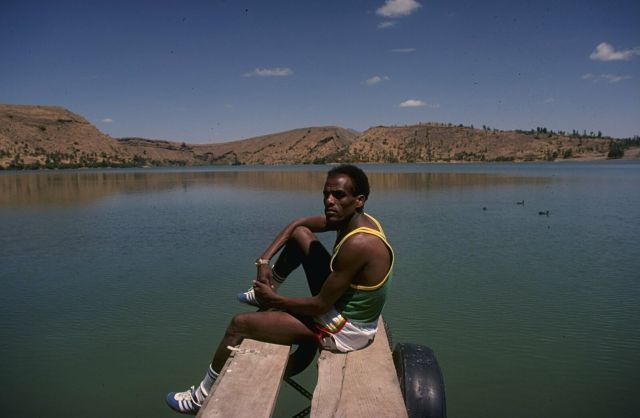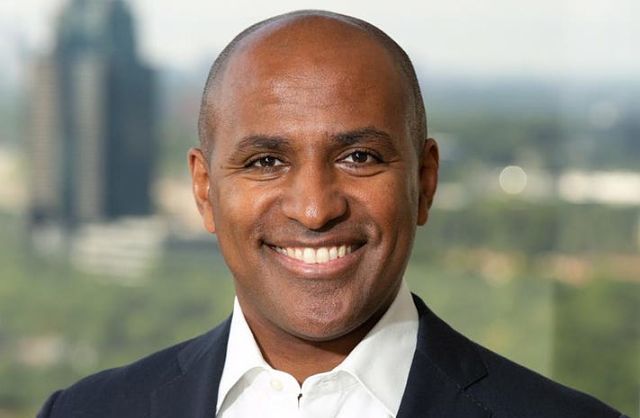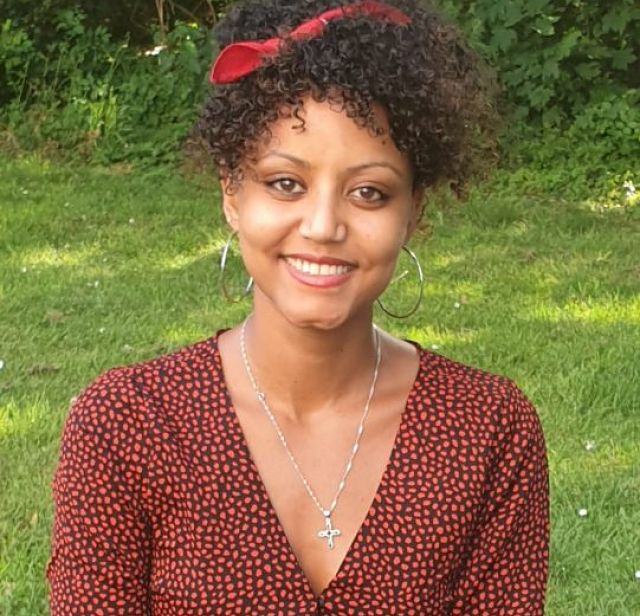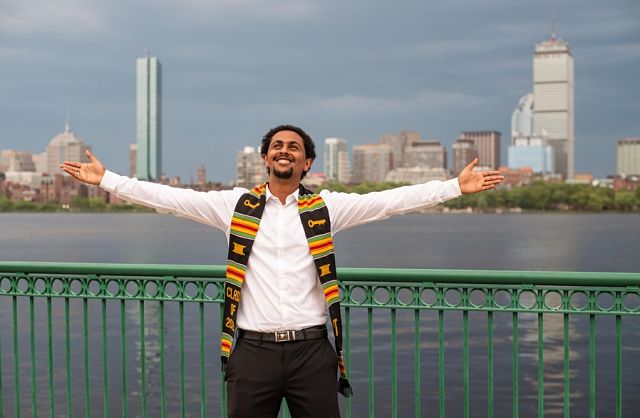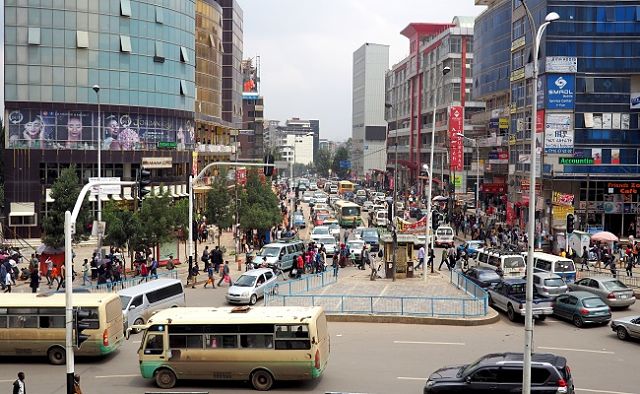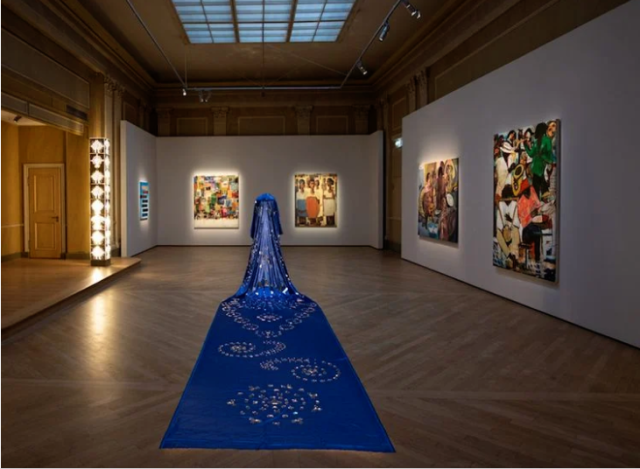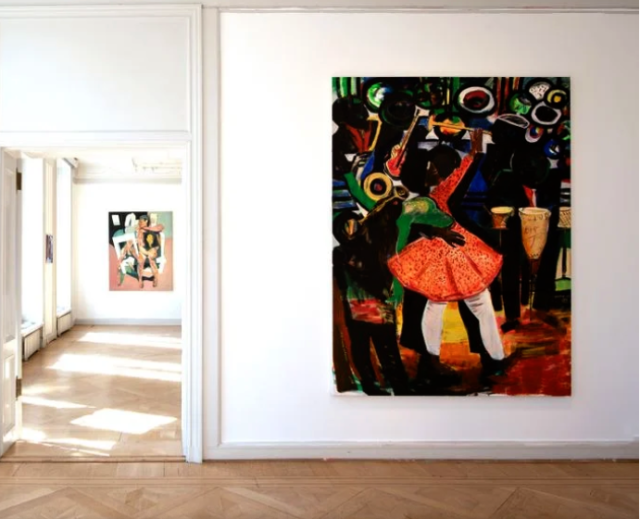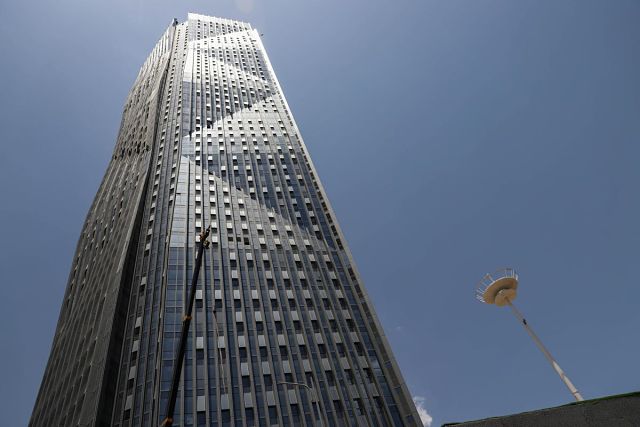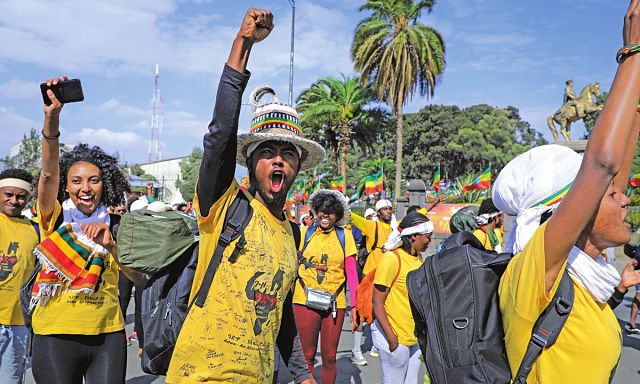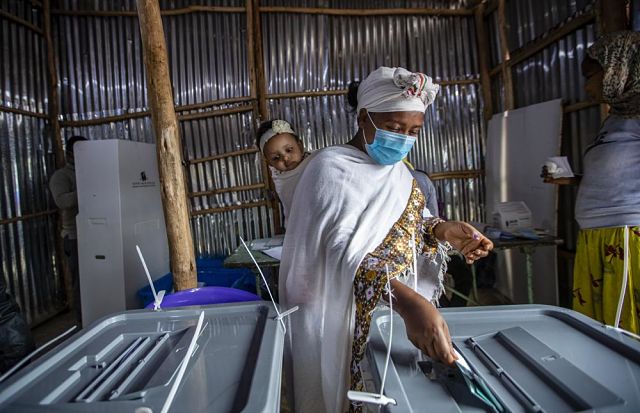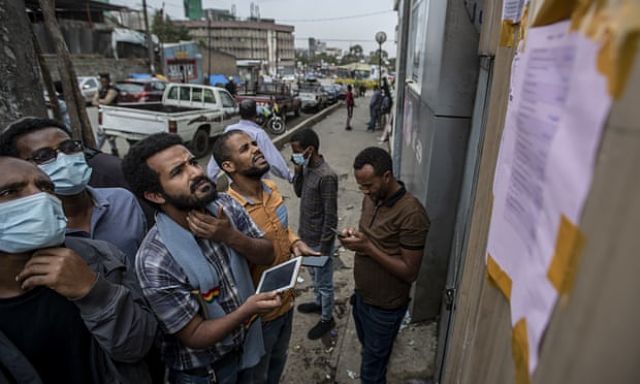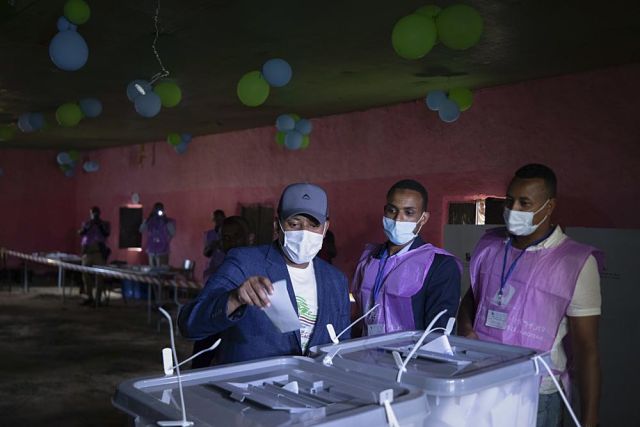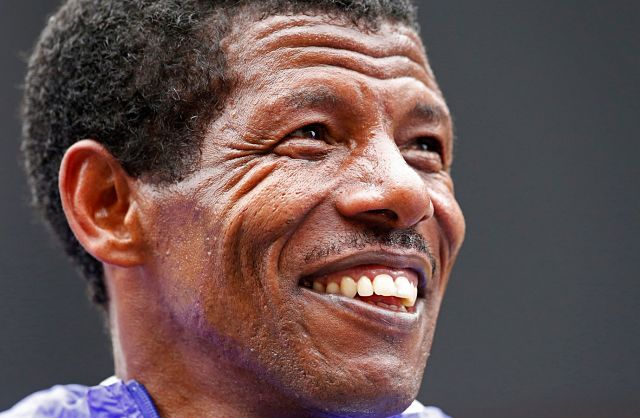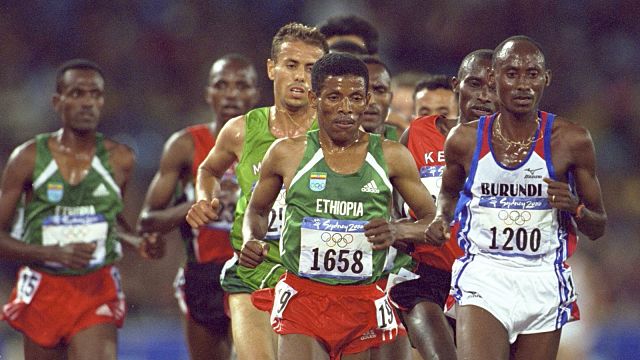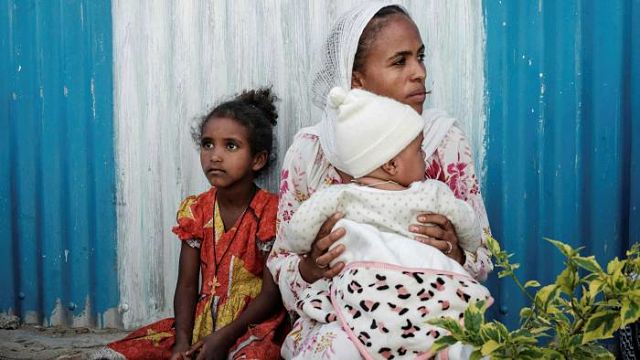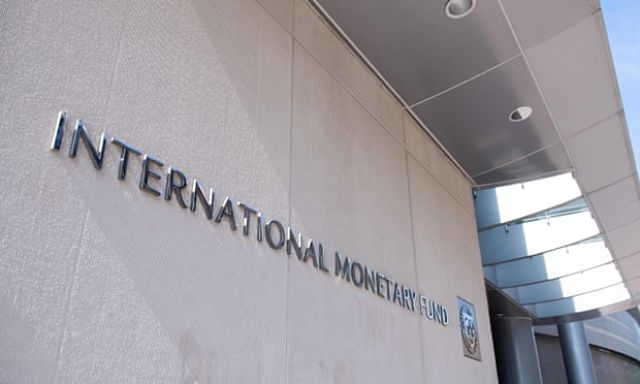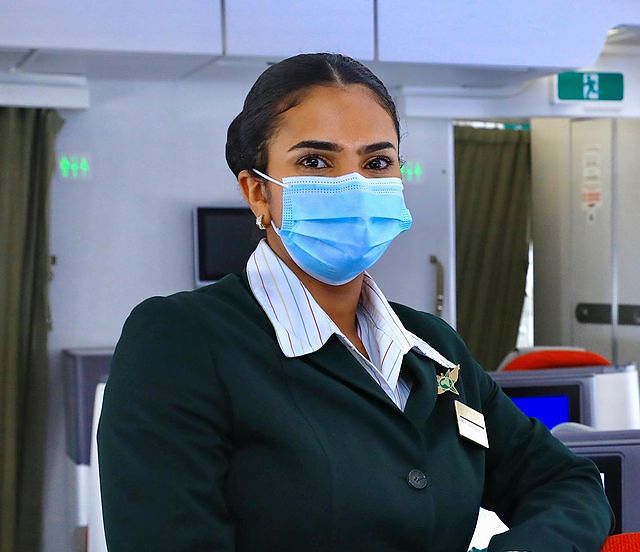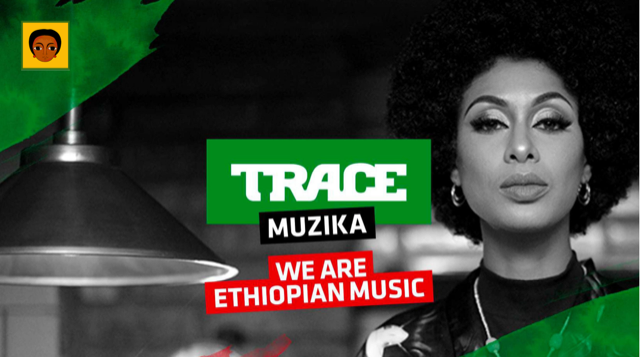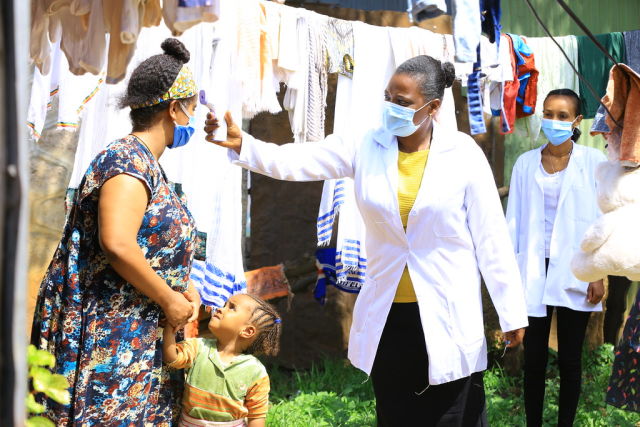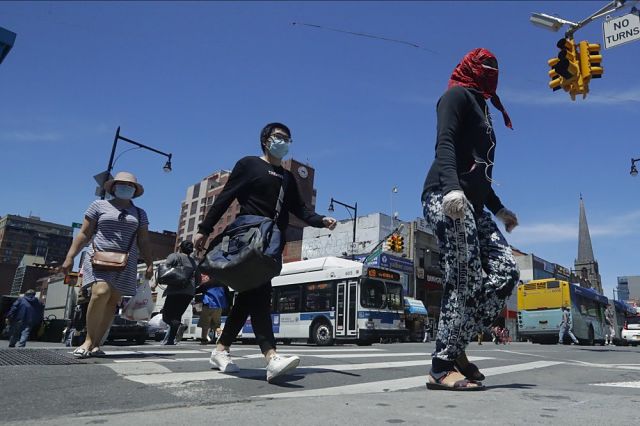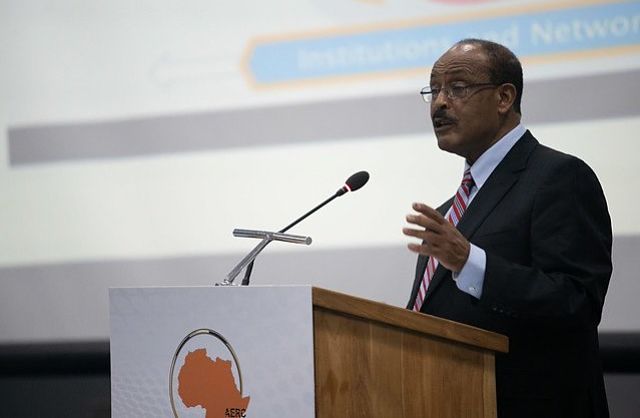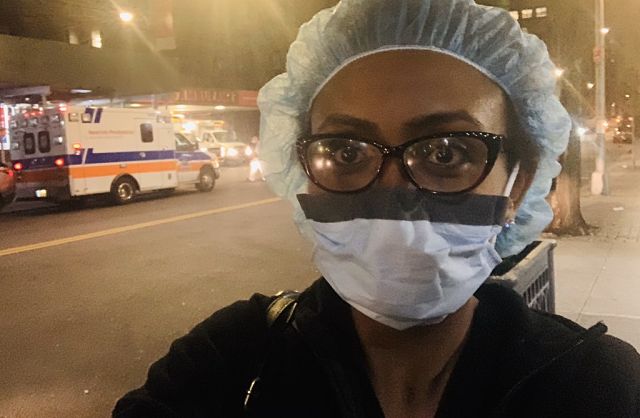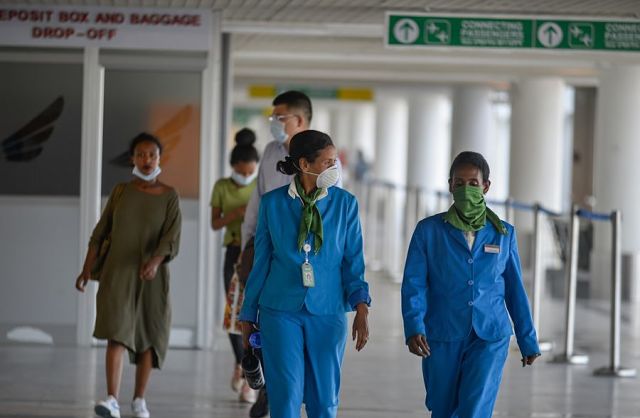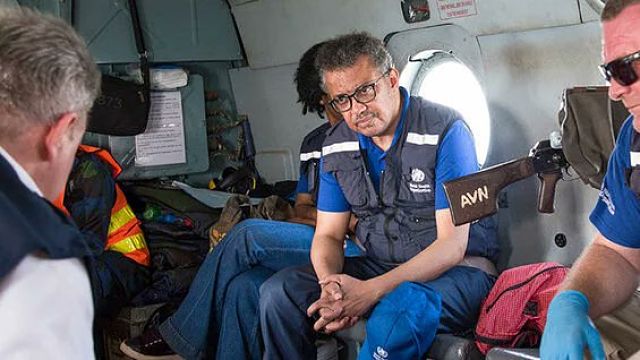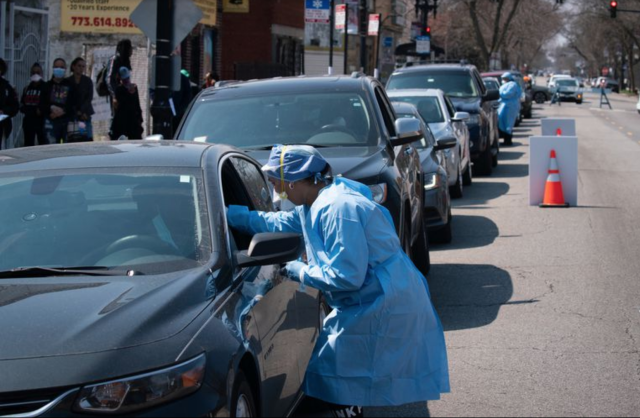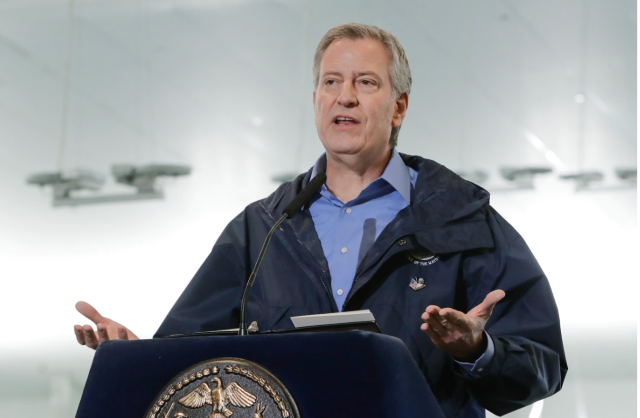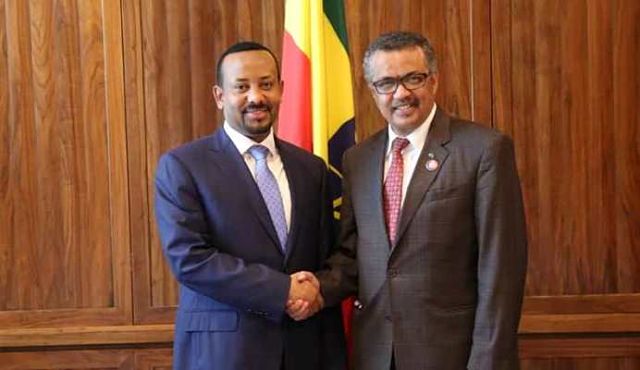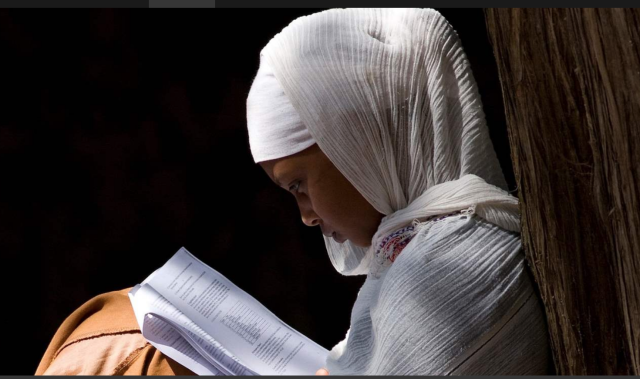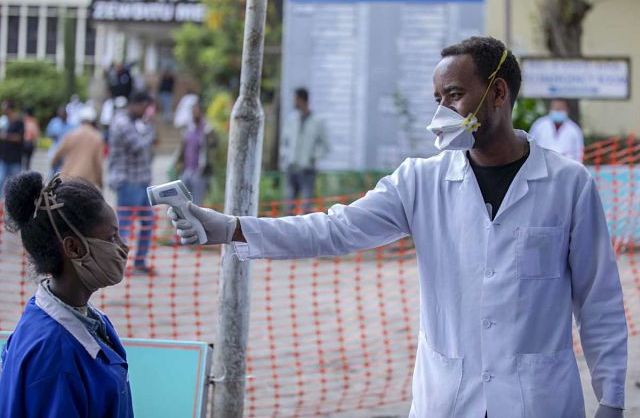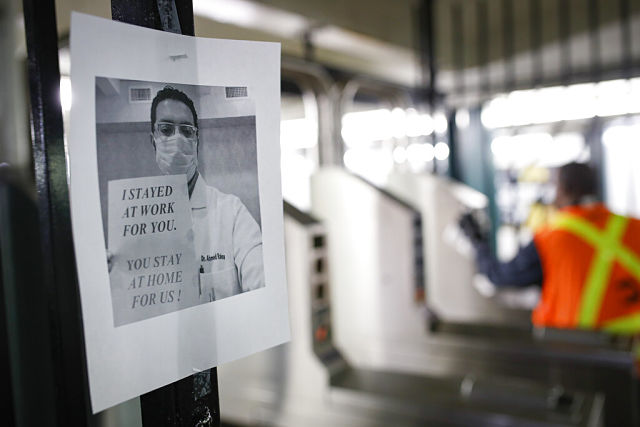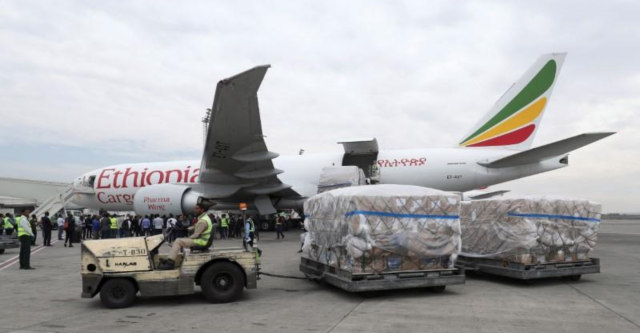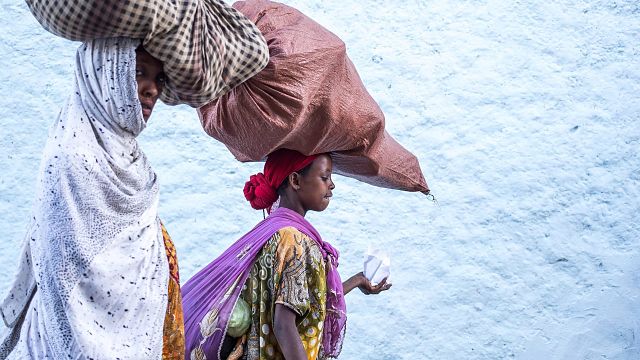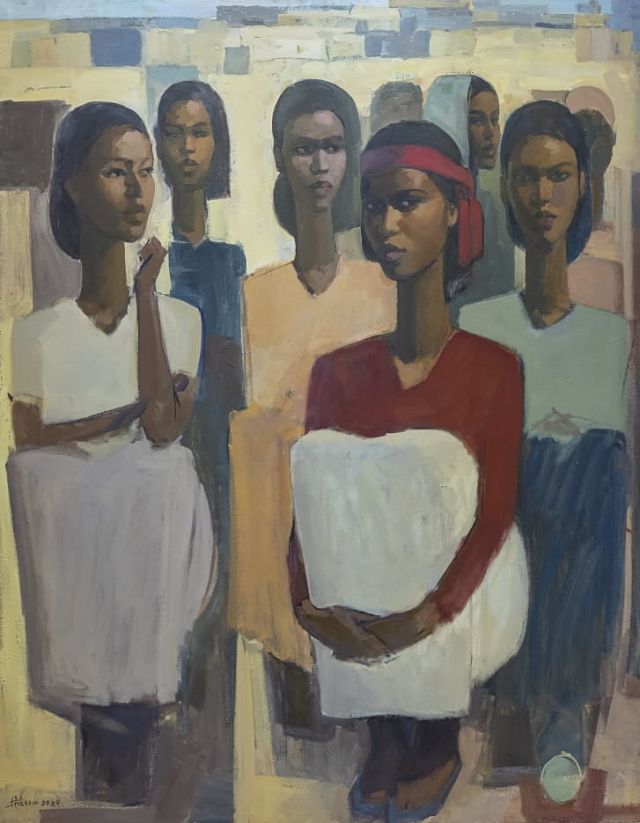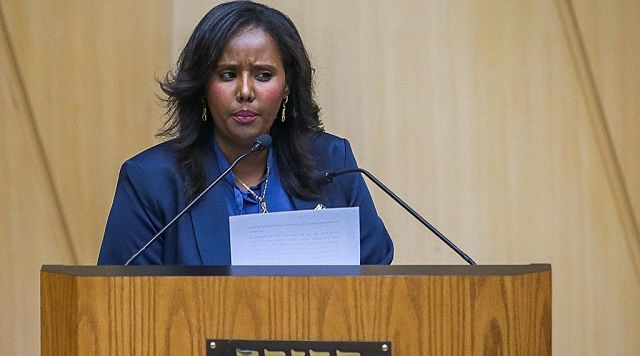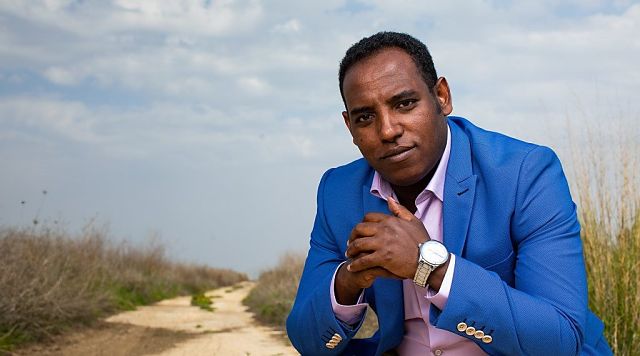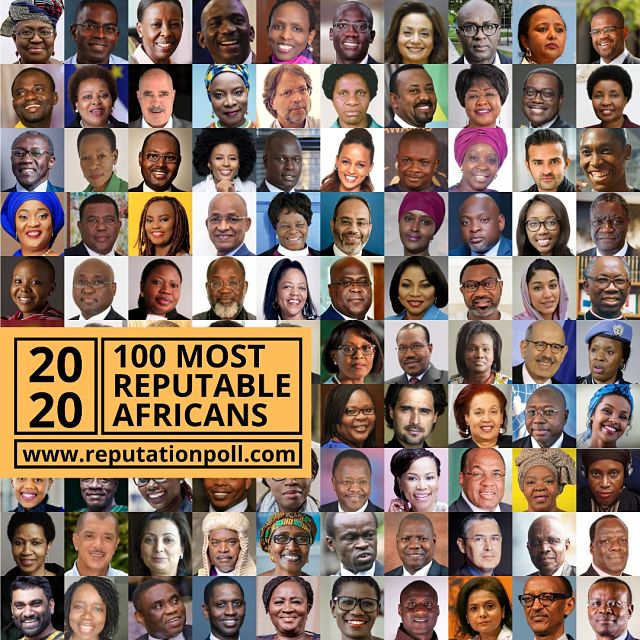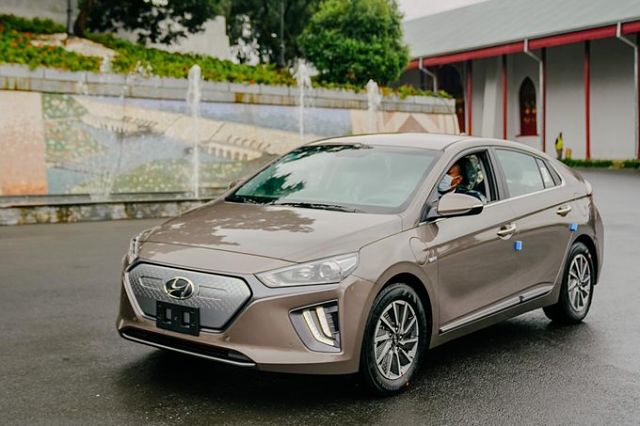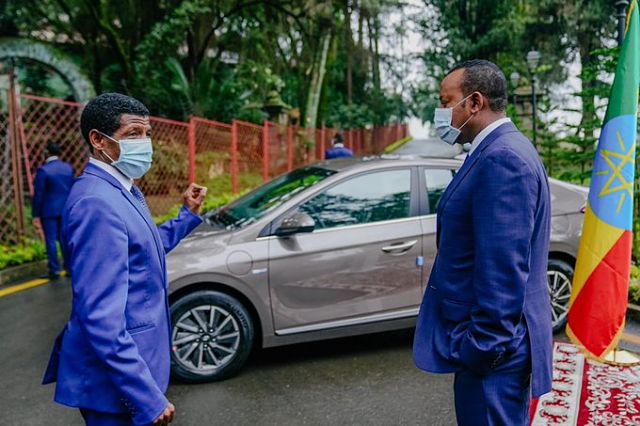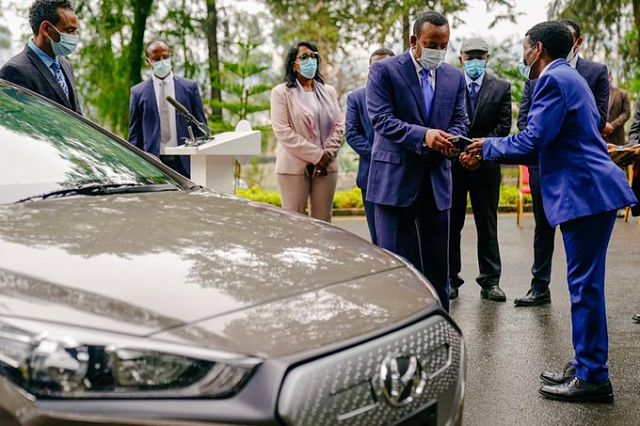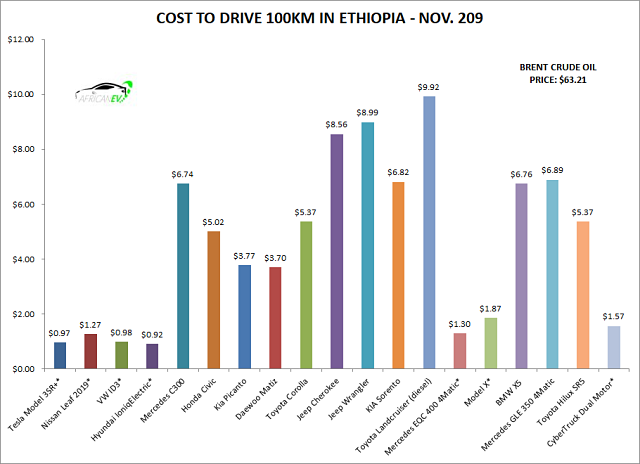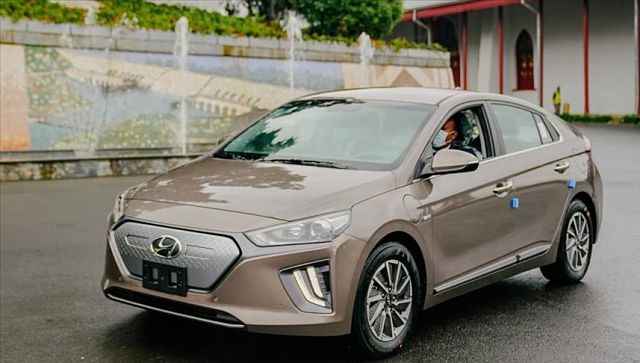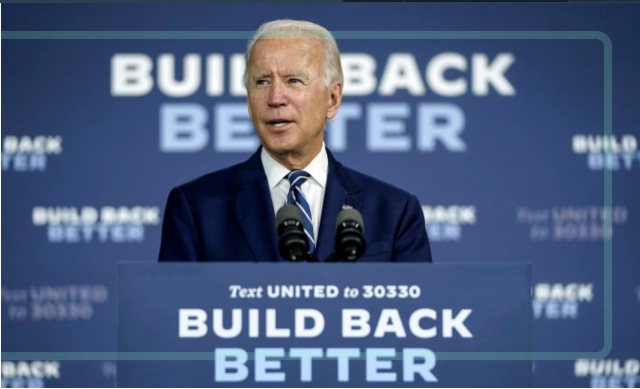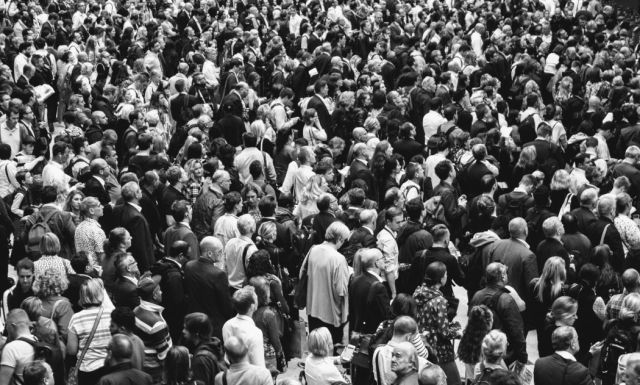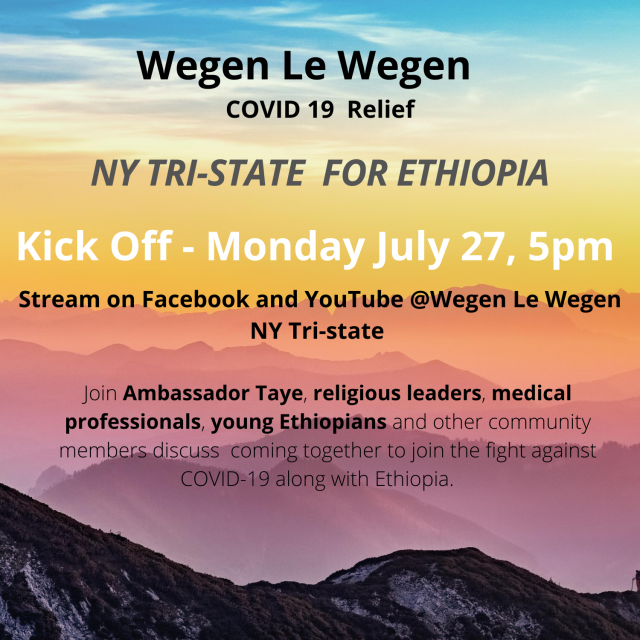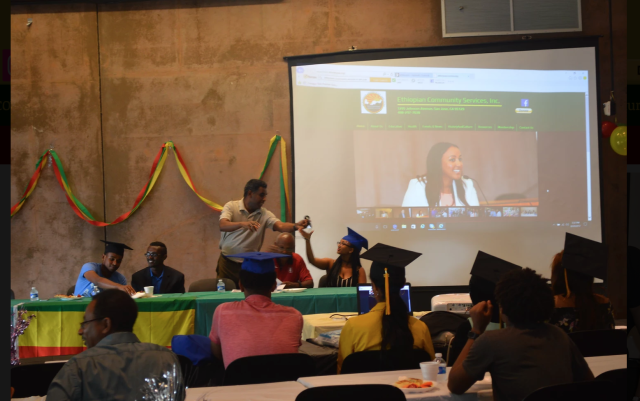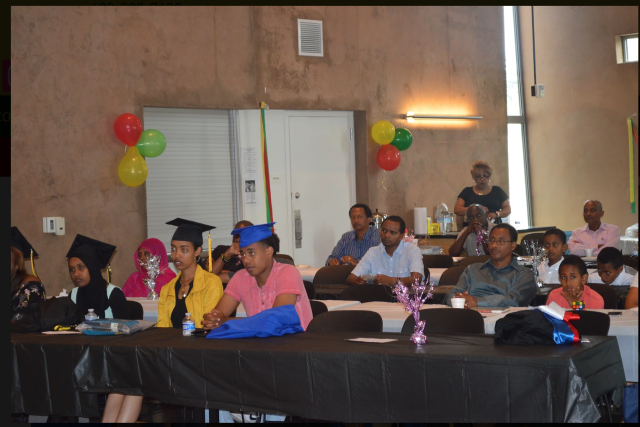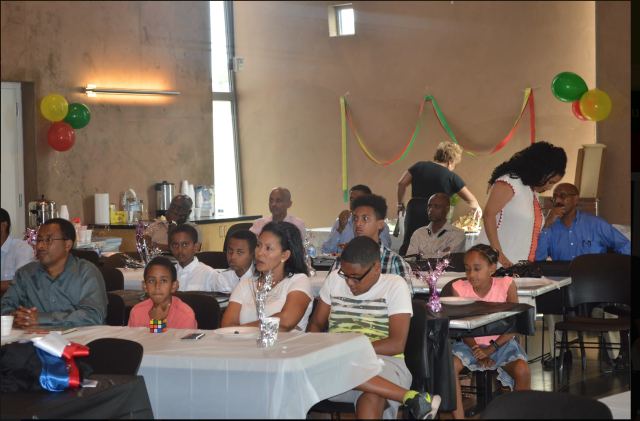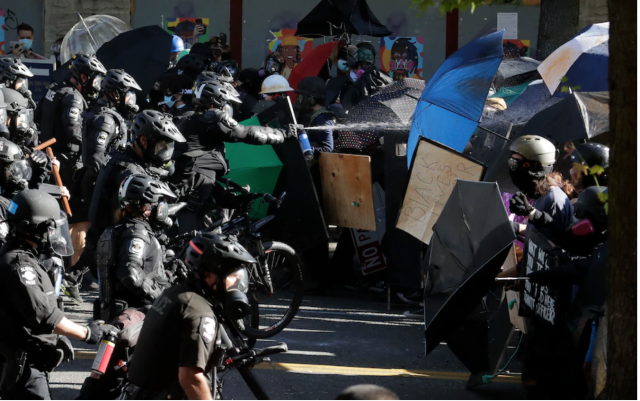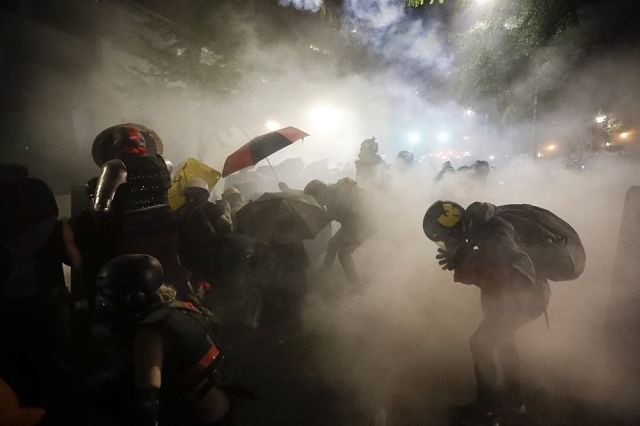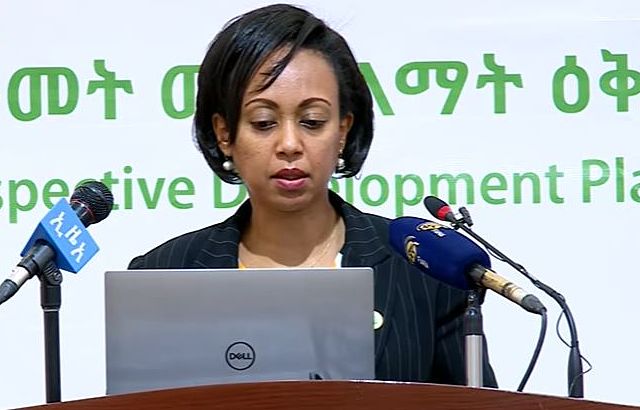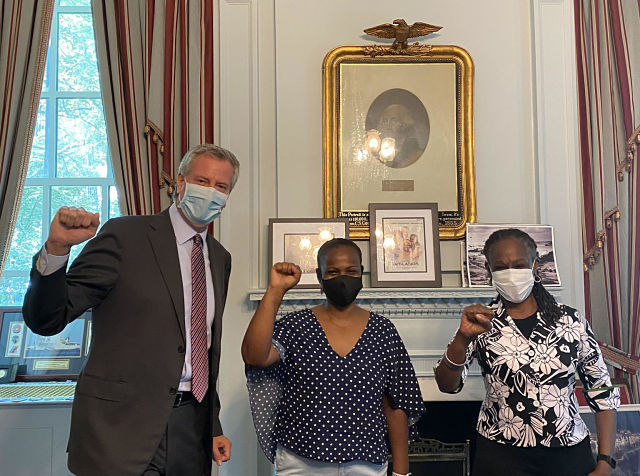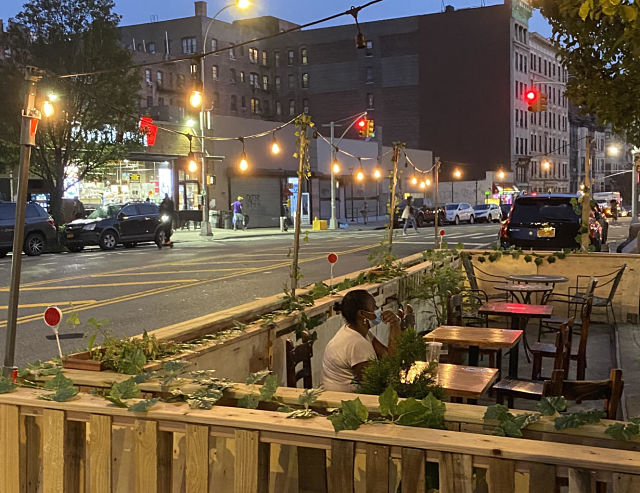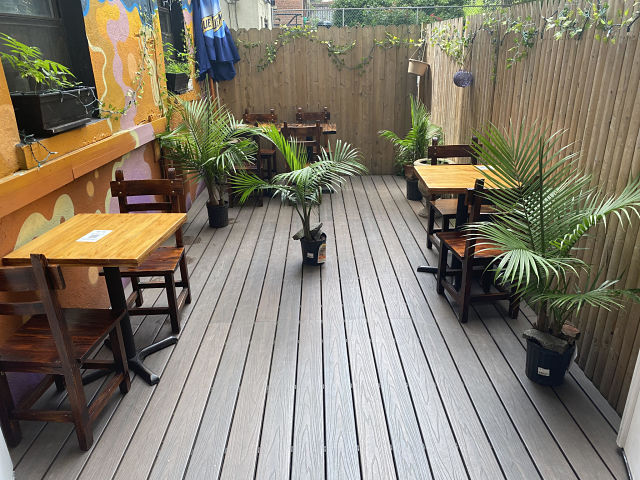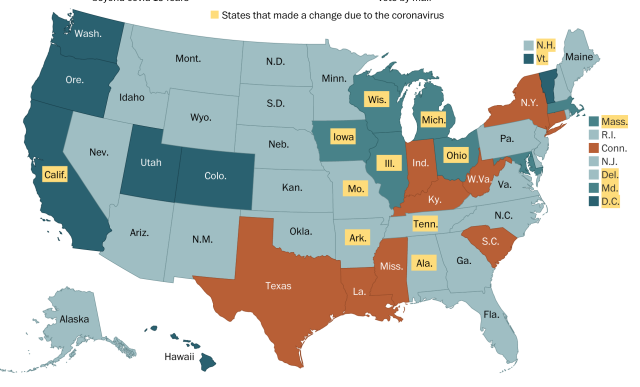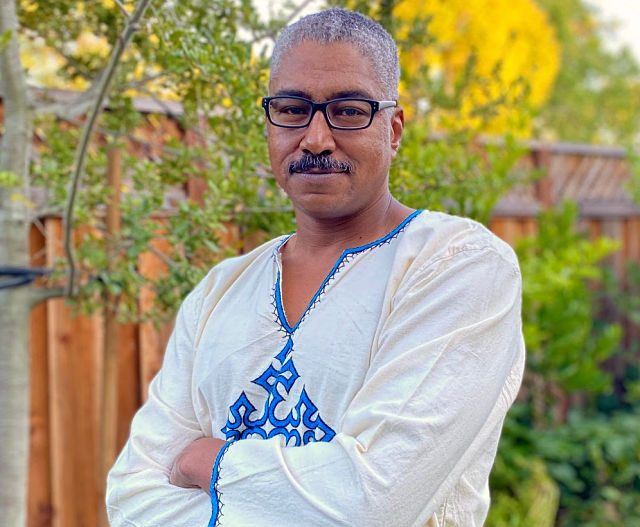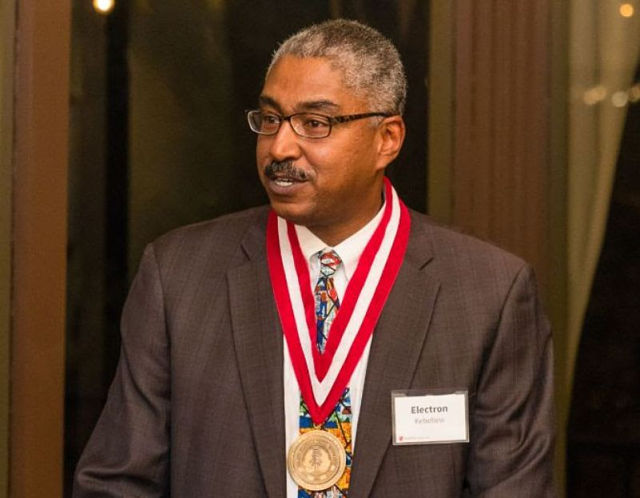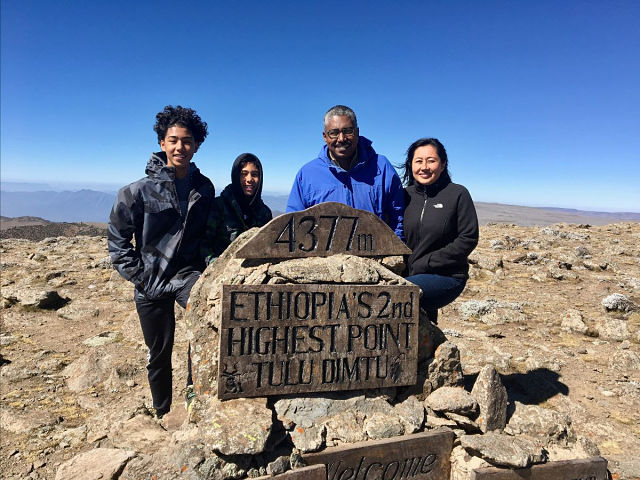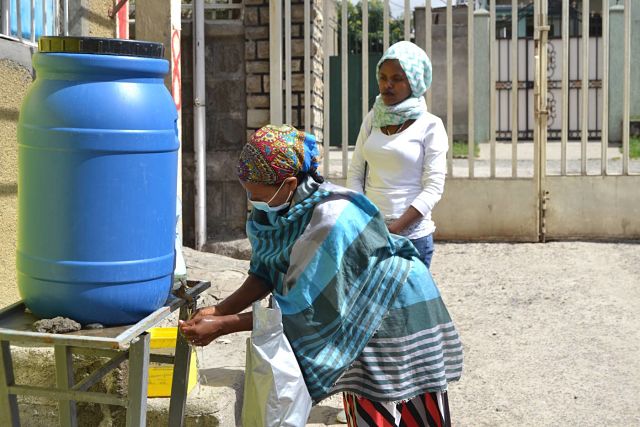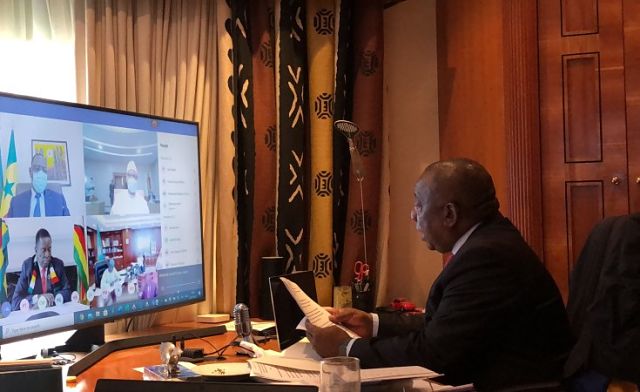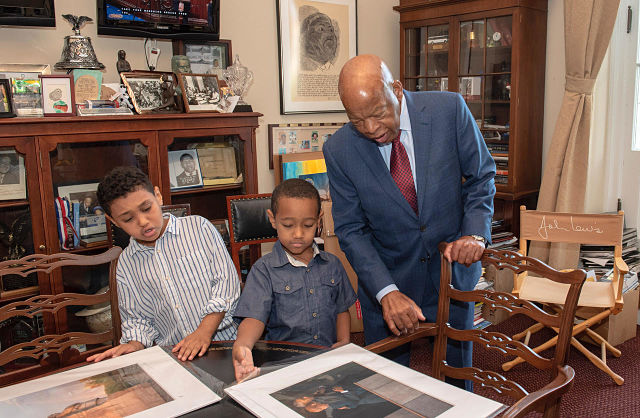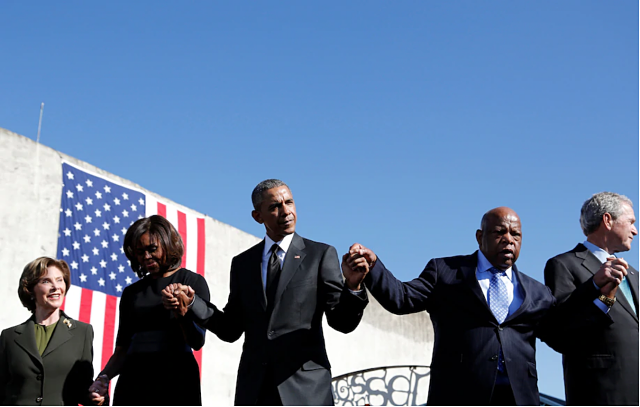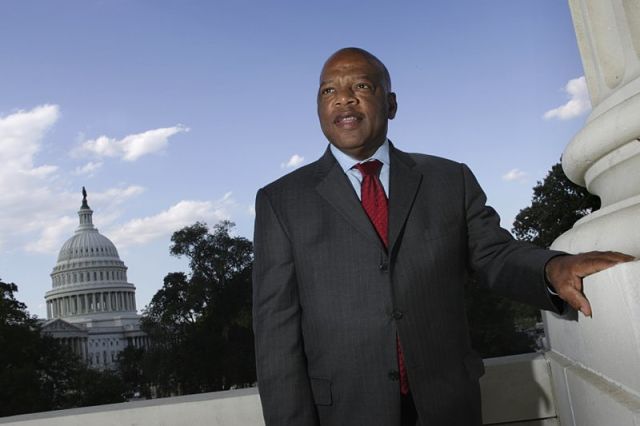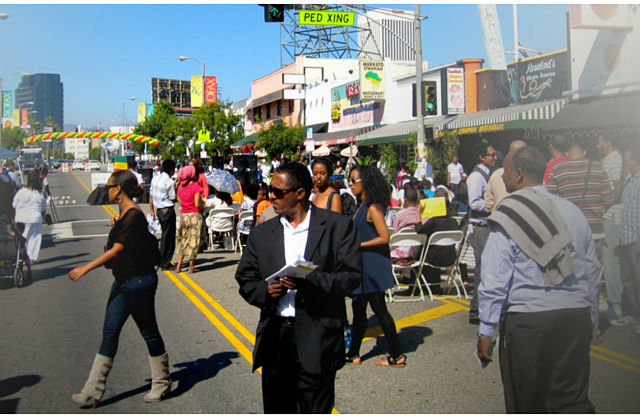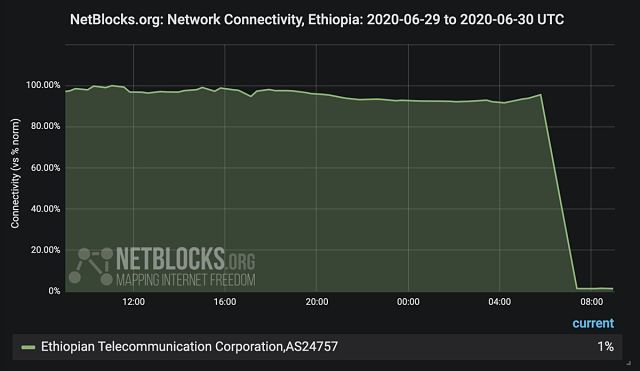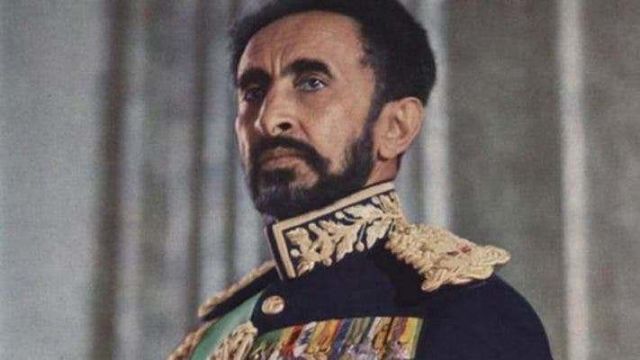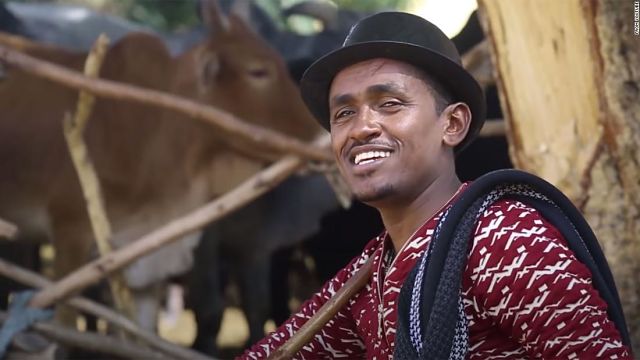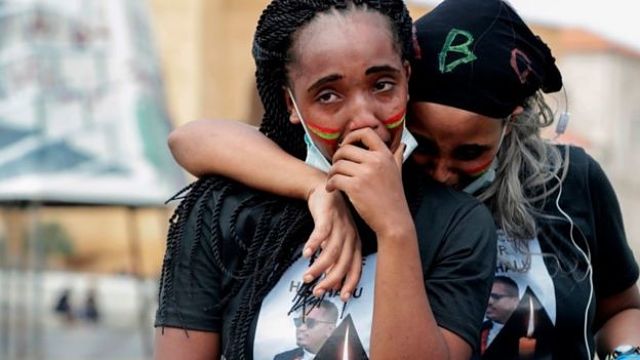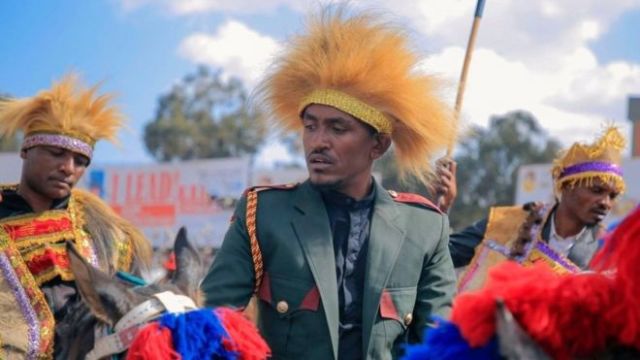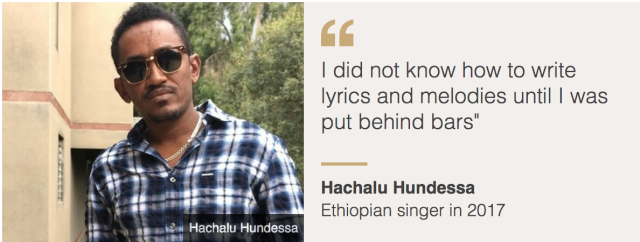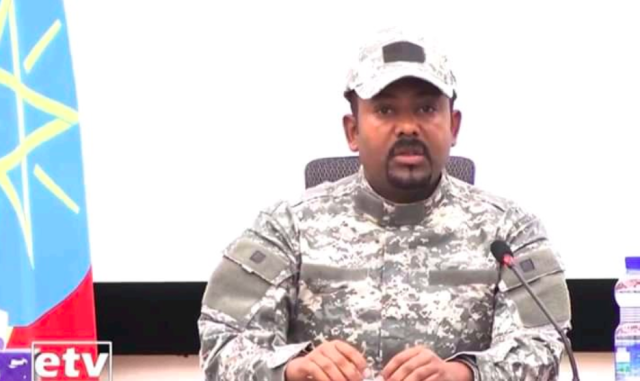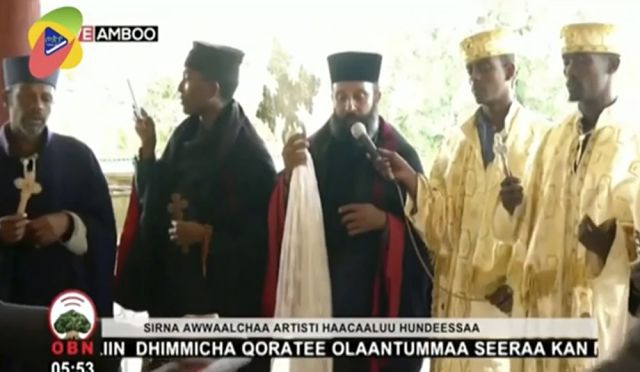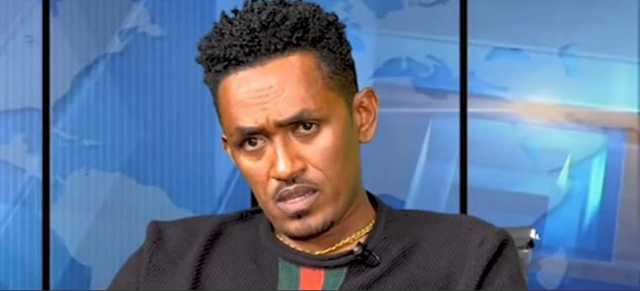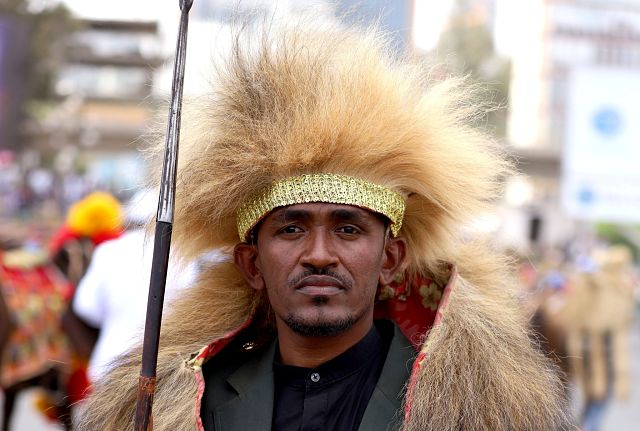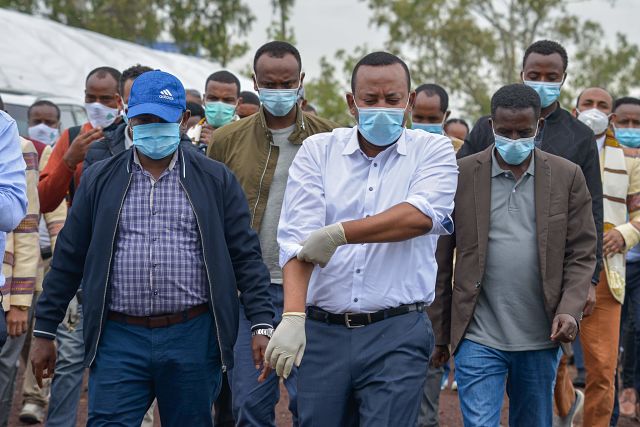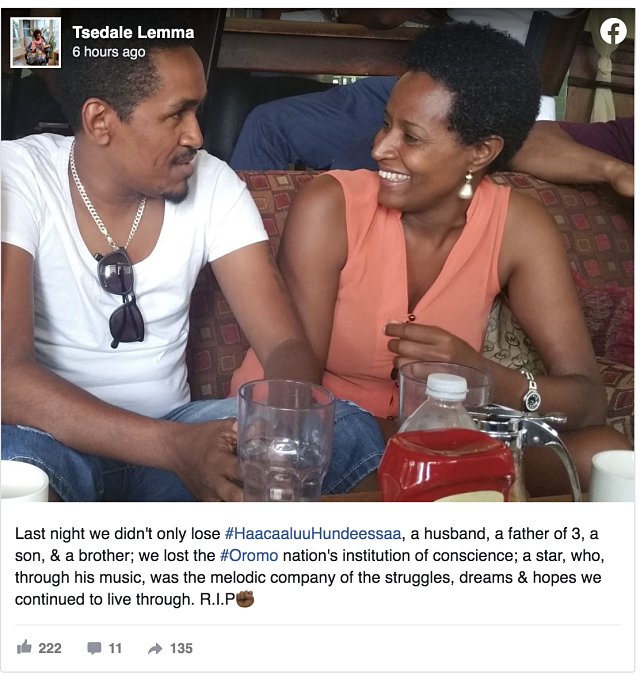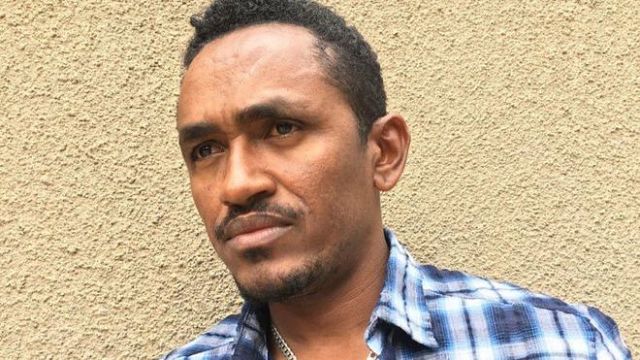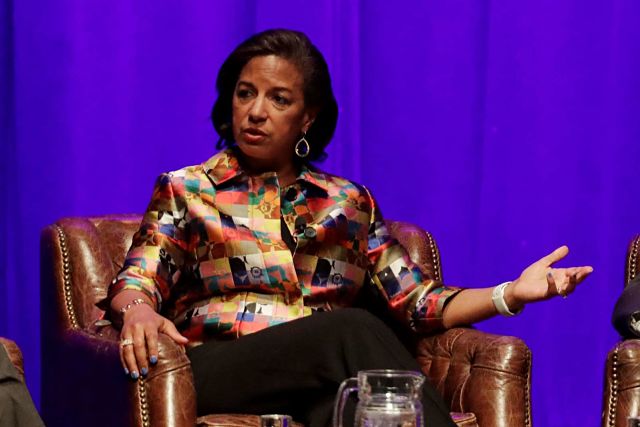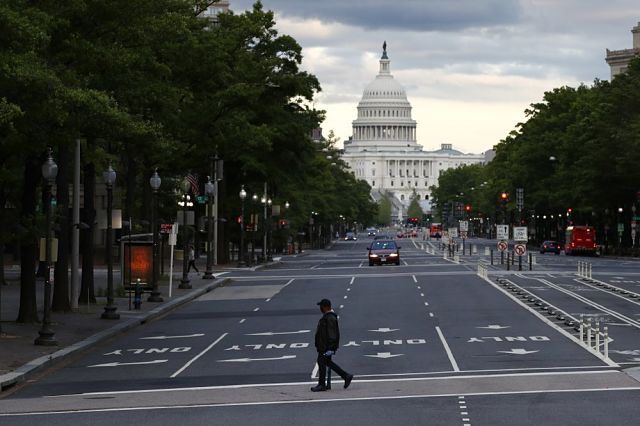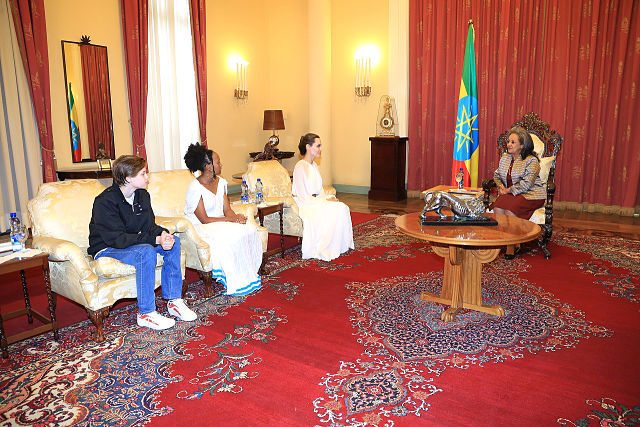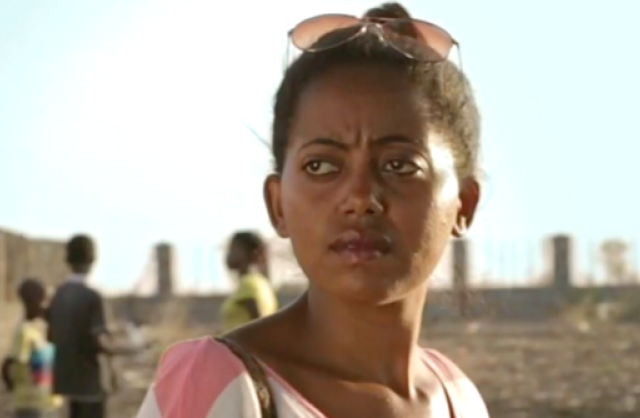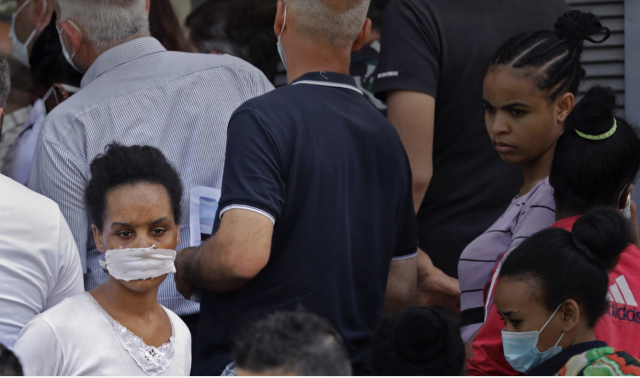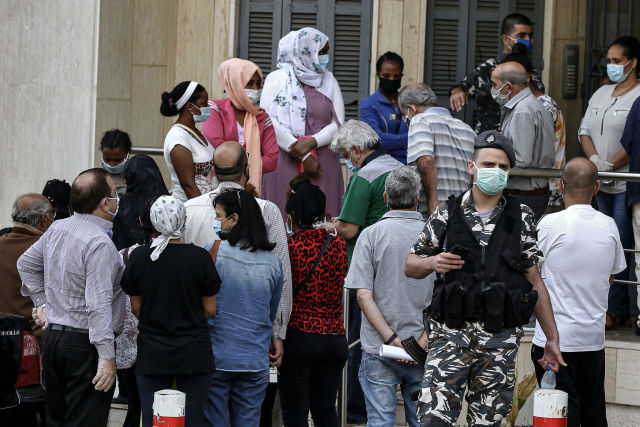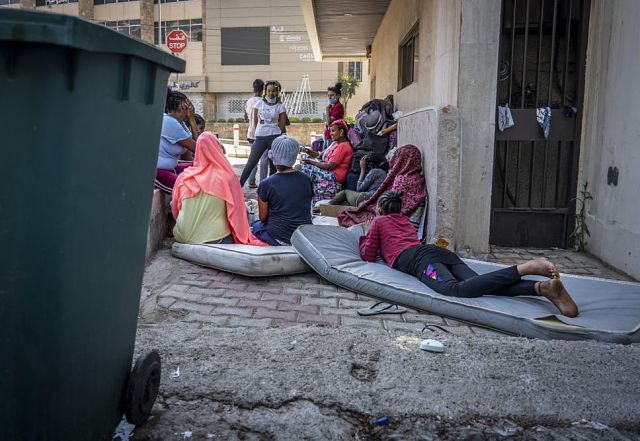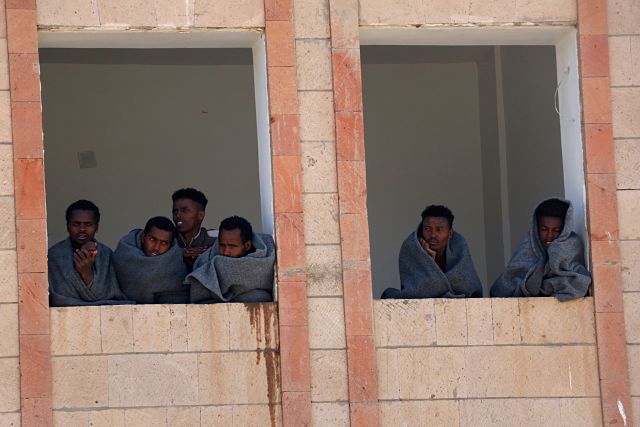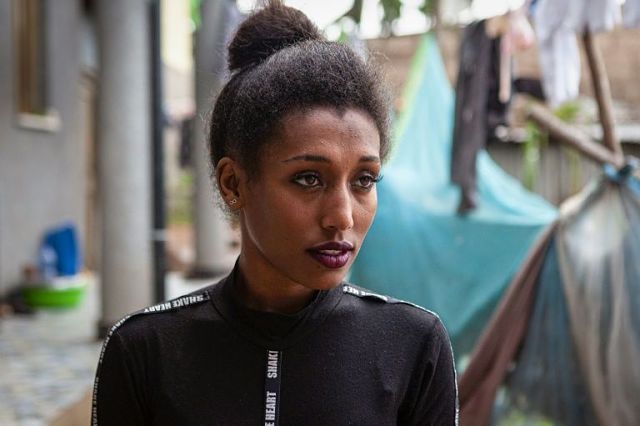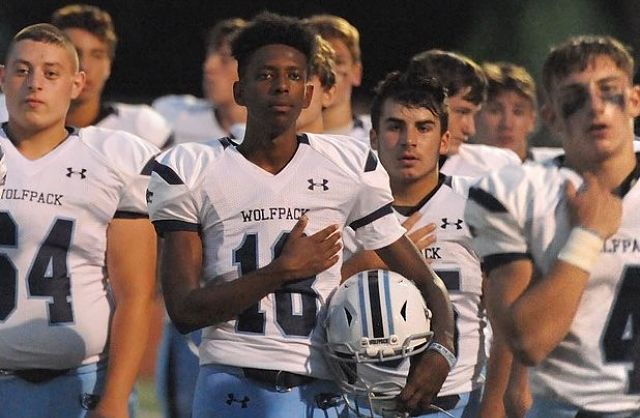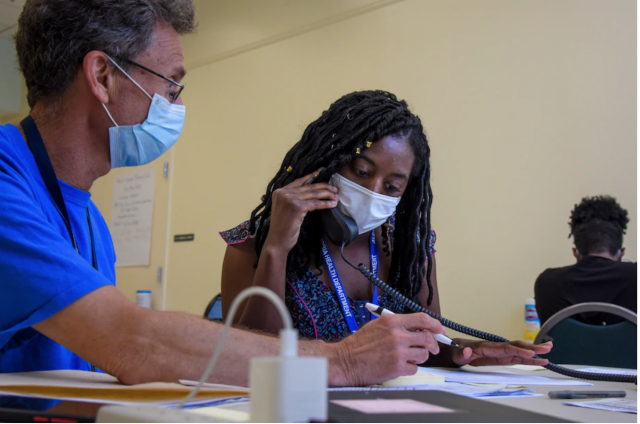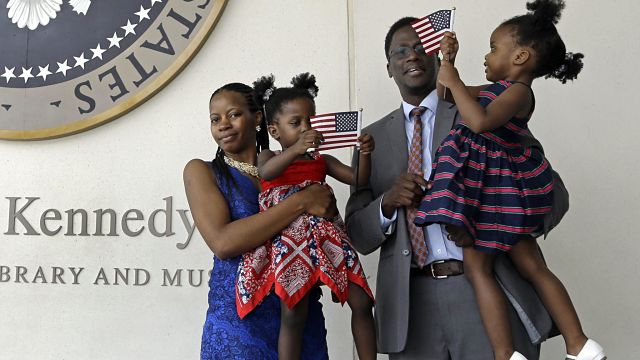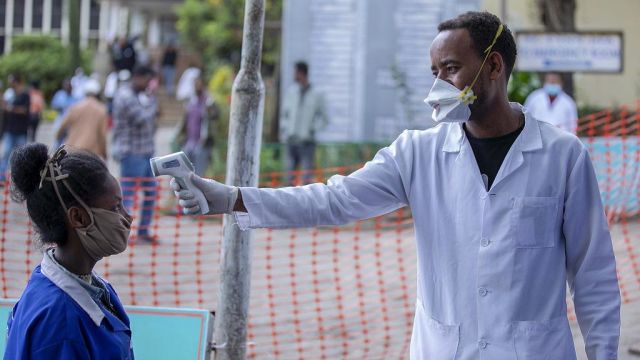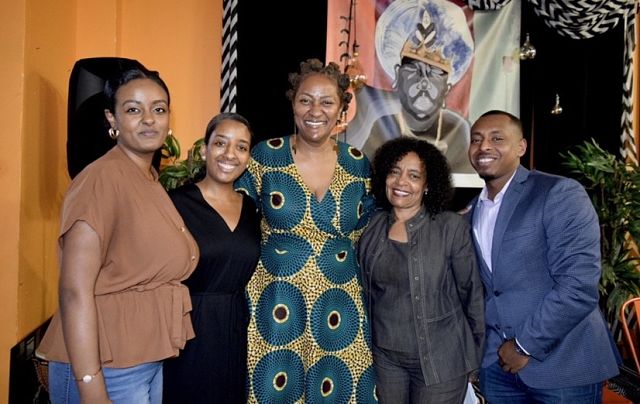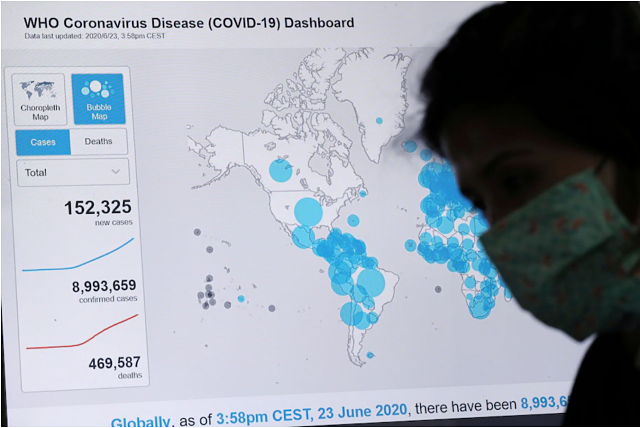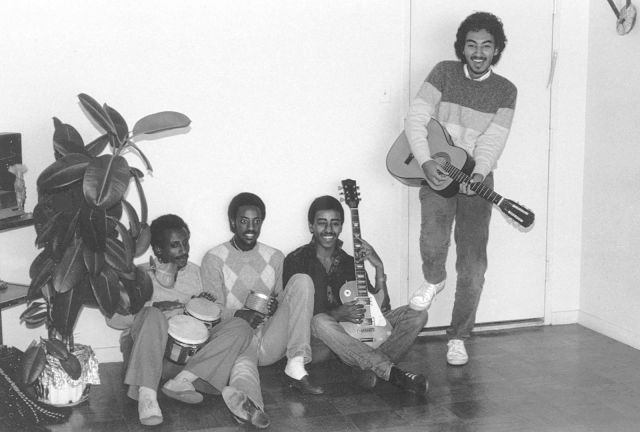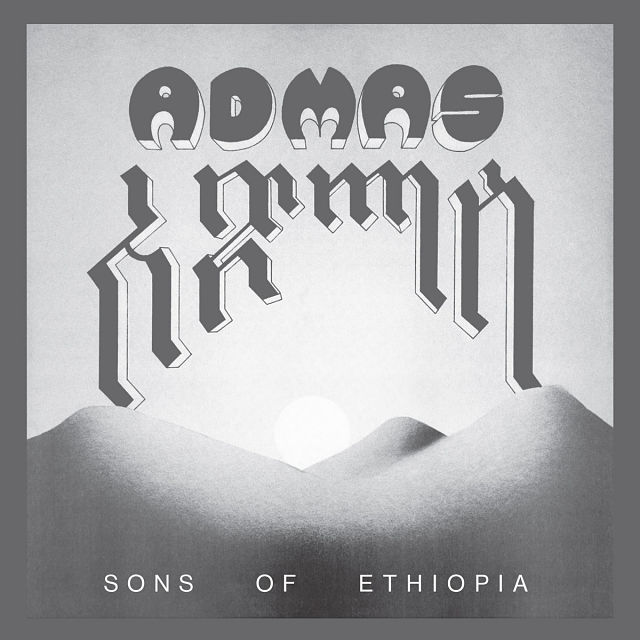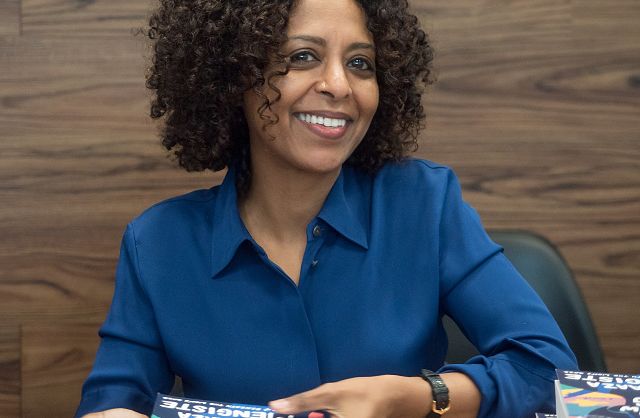 During remarks made to reporters on Tuesday, [Egyptian President Abdel Fattah al-Sisi] said that Egypt wishes Ethiopia success in generating electricity through the dam, but wants it to happen without harming Egypt’s water interests and its share in the Nile’s waters. (Egypt Independent)
During remarks made to reporters on Tuesday, [Egyptian President Abdel Fattah al-Sisi] said that Egypt wishes Ethiopia success in generating electricity through the dam, but wants it to happen without harming Egypt’s water interests and its share in the Nile’s waters. (Egypt Independent)
Egypt Independent
Egyptian President Abdel Fattah al-Sisi ruled out resorting to military action to settle the Grand Ethiopian Renaissance Dam (GERD) crisis, emphasizing that negotiations are the only way to solve the issue.
During remarks made to reporters on Tuesday, Sisi said that Egypt wishes Ethiopia success in generating electricity through the dam, but wants it to happen without harming Egypt’s water interests and its share in the Nile’s waters.
The negotiations surrounding the GERD occupy the minds of millions of Egyptians, for whom the Nile is a lifeline, and there are occasional calls by some Egyptians to solve the issue via military action.
Sisi responded to these views in his talk today and expressed his understanding regarding Egyptians’ concerns, saying: “Do make threats and idle talk. I respect every opinion, but don’t say we’ll do such and such a thing.”
Read more »
—
Grand Ethiopian Renaissance Dam – Making of Second Adwa: By Ayele Bekerie
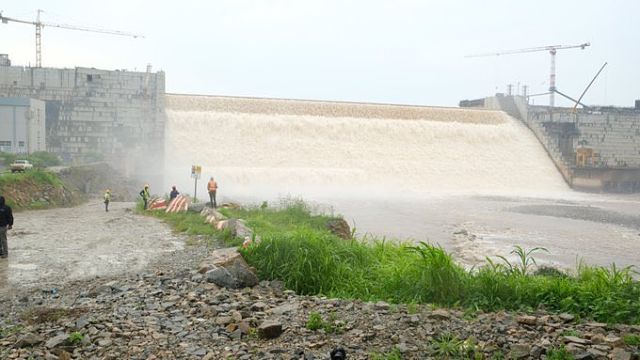
The author of the following article Dr. Ayele Bekerie is an associate professor at the Department of Heritage Studies, Mekelle University in Ethiopia. (Picture: The Grand Ethiopian Renaissance Dam via Twitter)
The Ethiopian Herald
By Ayele Bekerie (Ph.d.)
In 1896, Ethiopia registered one of the most decisive victories in the world at the Battle of Adwa by defeating the Italian colonial army. As a result, Adwa marked the beginning of the end of colonialism in Africa and elsewhere. Now, again, Ethiopia is on the verge of registering the second decisive victory, which is labeled the Second Adwa, by building and completing the Great Ethiopian Renaissance Dam (GERD) on the Abay/Nile River within its sovereign territory based on the cardinal principle of equitable and reasonable use of shared waters.
Operationalizing GERD means leveling the playing field so that Ethiopia also uses the shared waters and be able to converse with the lower riparian countries, on issues big and small, as equals. Egypt and Sudan affirmed their sovereignty and secure their socio-economic progress by building dams in their territories. Likewise, Ethiopia will make a critical contribution to peace and development in north east Africa, by engaging in an equitable and reasonable use of the Abay waters.
Abay River has a long history. Some of the major world civilizations were built on the banks and plateaus of the river. The River encompasses a wide array of natural environments and human habitations. Mountains, lakes, swamps, valleys, lagoons, moving rivers are places of farming, cattle raising or fishing. It is also a mode of transportation for dhows and steamers go up and down the river valley. In the ancient times, history has recorded positive relations between ancient Egyptians and Ethiopians. Trade thrived for a long period of time between the dynastic Egypt and what Egyptians call the Land of the Punt. Ancient Egyptians obtained their incense and myrrh as well as numerous other products from the Puntites. Egyptians revered and held the Puntites in high regard. They also paid homage to what they call the ‘Mountains of the Moon’ in East Africa. They recognized the mountains or the plateaus as sources of their livelihoods.
In modern times, relations turned unequal and imperialism dictated that brute force should be the arbiter of international relations. Colonialism created the center and periphery arrangements in which there were citizens and subjects. Abay was also defined and put into use in the context of serving the motherland, that is Great Britain in the 19th century CE. Modern Egypt inherited the strategic plan Britain has prepared with regard to the long-term use of the Nile waters. Britain developed a plan to make the whole Nile Basin serve the interests of Egypt. Dams were built in Egypt whereas reservoirs for Egyptian Aswan High Dam were built in Sudan, Uganda, South Sudan other upper riparian countries. With independence and with the unilateral construction of the Aswan High Dam, Egypt pursued a policy of hegemony. It fabricated a narrative that purported historic and natural rights to Nile waters. The treaties of 1902, 1929 and 1959 are used to justify its hegemony. The only agreement that Ethiopia signed together with Egypt and Sudan was the 2015 Declaration of Principles Trilateral Agreement.
The 1902 Treaty was between Britain and Ethiopia. Britain sought to control the sources of the Nile rivers and therefore signed a treaty with Emperor Menelik II in essence agreeing not to impound the river from one bank to the other. In 1929, Britain signed an agreement with Egypt that gave veto or hegemonic power regrading the use and management of the waters. Britain signed the agreement on behalf of its colonial territories in equatorial Africa. With independence, the agreement became null and void. Julius Nyerere, the first president of Tanzania, rejected the 1929 Treaty by arguing that Tanzania was no longer a colonial subject nor a signatory of the treaty and therefore would not be bound by it. Nyerere’s argument later labeled the Nyerere Doctrine, which states that “former colonial countries had no role in the formulation and conclusion of treaties done during the colonial era, and therefore they must not be assumed to automatically succeed to those treaties.” As an independent and never-colonized country, Ethiopia had nothing to do with the 1929 Treaty. It is indeed absurd, even immoral for Egypt to cite the treaty in its argument with Ethiopia.
The 1959 Treaty was solely between Egypt and Sudan. The treaty allocated the entire waters of the Nile to Egypt and Sudan. Egypt was allocated 55 billion cubic meters of water, while Sudan got 14 billion cubic meters of water. The treaty was arranged by Britain to serve it neocolonial interest in the region. The treaties are not only outdated, they are also outrageous, for they privilege Egypt, a country that does not contribute a drop to the waters of the River.
Invented narratology of Egypt’s historical and natural rights is central to her arguments to keeping the vast amount of the waters to herself. She brings an argument of ‘the chosen people’ by claiming that Egypt is the ‘Gift of the Nile.’ It passionately advances unilateral and hegemonic use of the waters to herself by distorting the notion of the gift. Gift implies giver and receiver. Further, the receiver ought to acknowledge to giver of the gift. After taking the gift, displaying or acting against the giver is tantamount to biting the hand that feeds. The notion of reciprocity and cooperation among the givers and receivers of the Gift should have been the basis of life in the Nile Basin. Instead we have a government in Egypt that pursue a policy of conflict and escalation in the region.
Egypt, following the long Pharaonic rule, fell under the rule of outsiders for over two millenniums. Among the outsiders were the Greeks, the Byzantines, the Romans, the Arabs, the Turks and in modern times, the French and the British. The occupation and annexation of the territory by outsiders may be quite unique. It is such distinct history that gave a sense of aloofness and duplicity to the Egyptian elites, particularly in their interactions with the upper riparian countries. To-be-like the colonizers have become the norm in Egypt. It is not unusual for Egypt to continue looking at fellow Africans with jaundiced eyes, attempting to perpetuate hierarchical and unequal relations.
Egypt continues to preach policies that are written during the colonial times. For her, the gift means controlling and regulating the Nile waters from the sources to the mouths at all times. Egypt’s need supersedes the needs of all other riparian countries. The ever-expanding demand of the Egyptians for the Nile waters made it difficult to reach win-win agreements among the people of the Nile Basin. Unlike the fellaheen of the past, the resident on the banks of the Nile, seeks water for drinking, navigation, generation of electricity, irrigation and recreation. Export crops, vegetation and fruits take a good portion of the waters. Manufacturing industries also consume their share of the water. The cottons grown on the most fertile alluvial soils of the valley are the most preferred raw materials for the cotton mills of Liverpool and Manchester in Britain. The mode of production and distribution of goods and services in modern Egypt tend to favor a regiment of hostility and hegemony to upper riparian countries.
Ancient Egyptians used the Nile waters for farming and navigation. They used the waters to sustain lives and to build cultural monuments and temples, such as the pyramids. They burn incense and spread green grasses in their temples in honor of the mountains of the moon, which they attribute as the sources of the Nile waters. Ancient Egyptians made best use of the waters. They built a civilization and shared the outcome of it with the rest of the world, let alone its southern neighbors in Africa. Ancient Egyptians gave us calendar, writing systems, religion, architecture, wisdom, and governance.
Even those who occupied Egypt in ancient times immersed themselves in tieless traditions of ancient Egypt. The Greeks established themselves in Alexandria. The French scholars deciphered the hieroglyphics, thereby opening the gates of Egyptian knowledge for the world to share and learn from.
The soils and waters of the Nile transformed ancient Egypt perhaps into the greatest power on earth for over three millenniums. Moreover, ancient Egyptians had the longest trade and cultural relations with the Land of the Punt, a reference to upper riparian countries in the Horn of Africa. It is therefore incumbent upon the modern Egyptians to uphold the traditions established by their ancestors and see cooperation and friendship with Ethiopians of the old and the new, that is with the people of Africa.
While Egypt and Sudan built dams in their sovereign territories, Ethiopia did not until she took the bold move to start building one on the mighty Abay River. GERD is nine years old. It is bound to be completed within the next two years. BY making GERD a fact on the ground, Ethiopia will be in a position to ascertain her sovereignty, framing her arguments on the right to use and share the waters, so to speak, dam-to-dam conversations among the tripartite states.
Egypt’s authority with regard to Nile waters is rooted in its ability to build the Aswan High Dam and century storage on Lake Nasser. Such a strategic move allowed her to talk substance and be able to prosper. It also allowed her to establish institutions to generate knowledge on the hydrology of the Nile. Its Ministry of Water Resources and Irrigation is one of the largest and well-financed ministries’ in the country. Even the propagation of distorted information about GERD is facilitated by the presence of thousands of highly trained water engineers and technologists, who are not ashamed of advancing the nationalist agenda. In the process of furthering the interest of Egypt, the narrative about the Nile Rivers turned Egypt-centered. Her army of engineers and technologists and diplomats have infiltrated international organizations in large numbers. The financial institutions, such as the World Bank and IMF, are under the influence of Egypt. Egypt falsely exaggerates her water needs and place herself as utterly dependent on the Nile waters. Her arguments do not address the presence of trillions cubic meters of aquifer and the feasibility of turning the salt water of the Mediterranean Sea and the Red Sea into fresh potable water.
It is in this context that Ethiopia has to remain focused on her agenda of building and using GERD. Doing so will be the only way to force Egypt from her false narrative. GERD will stop Egypt the pretense of claiming to be the sole proprietor of the Nile waters. The Arab League is heavily influenced by Egypt. It is a mouthpiece of Egypt. Its conventions often are the reflections of its sponsors. IT is also ineffective when it comes to serious issues, such as the Palestinian question, the Yemen and Syrian Civil Wars. The League may provide an international platform to Egypt, but its declarations are toothless.
The European Union, at present, is advocating for equitable use of the waters and favor negotiated settlement of outstanding issues. Britain, given her neocolonial interest in Egypt and Sudan, she may side with Egypt. Since she is the mastermind of the strategic plan of the entire Nile Basin, including the selection of sites of the dams as well as their constructions. Since Britain is on its way out of EU, reasonable and equitable use of the Nile waters in a cooperative manner may become central element of EU’s Nile River policy. On the contrary, Britain prepared the master plan for Egypt to become the super power of the Nile Basin. It is therefore our duty to see to it that EU and Britain compete to earn our attention. Refined diplomacy is needed on our part to make a case for our legitimate use of the Abay River and its tributaries.
The Arab League and EU are two separate international organizations. While the Arab League is in the fold of Egypt, EU maintains a cordial relation with Ethiopia. The Arab League is not known in solving issues within or without. Even in the recent convention of the League, countries, such as Qatar, Djibouti, Sudan and Somalia disagreed with the final decision and urged the tripartite countries of the eastern Nile Basin to solve their problems by themselves.
In short, Egypt is making noise, perhaps louder noise by going to the Arab League or EU. The UN Security Council refused to preside over the issue and advised the parties to continue their negotiations. GERD paves the way for real cooperation among the riparian countries.
Egypt built the Aswan High Dam in collaboration with the then Soviet Union with the intent of utilizing the Nile waters to the maximum level. Egypt deliberately placed the Dam near its southern border so that it takes maximum advantage of the water for reclamation and other uses of water throughout Egypt, including the Sinai, across the Suez Canal. For the High Dam to remain dominant, Egypt was directly or indirectly involved in designing and building dams in Sudan, South Sudan, Uganda, and Congo Democratic Republic. The dams or canals in the Equatorial Plateau are designed at sites that serve as reservoirs for Aswan. They are designed to release water on a regular or monitored bases so that Aswan always gets a predictable amount of waters. The artificial lake, Lake Nasser is not only growing in volumes, but it is also displacing hundreds of thousands of Nubians from their homes, temples and farmlands both in southern Egypt and northern Sudan. The destruction on ancient heritages in Upper Egypt and Lower Nubia to make space for the massive lake is incalculable.
As stated earlier, modern Egypt anchors itself primarily on Arab nationalism. The attempt to politicize Islam and to perceive Ethiopia as a Christian country often fails to generate support for the elites of Egypt. Islam is present in Ethiopia since its inception in the seventh century CE. Ethiopia gave sanctuary to the first followers of the Prophet. Islam, in the present-day Ethiopia, is influential. It is playing a significant role in shaping the society. On the other hand, Egypt’s Pan-African identity has been let loose since the end of the great ancient Egyptian kingdoms. Modern Egypt was established by Ottoman and Arab rulers. It can be argued that Egypt’s approach to Africa is tainted with paternalism. Egypt enters into agreement with the upper riparian countries in as long as it is free of challenging her self-declared water quota.
The Nile Basin Initiative remained frozen because of Egypt’s refusal to join the Secretariat with a headquarter in Entebbe, Uganda. Sudan is also hesitating to join the group, even so it has a good chance of reversing its position, given the new transitional government in there. Egypt is working actively to divide the member states of the Initiative. Recently, Tanzania was awarded a dam, entirely paid by the Egyptian Government, on a river that does not flow into the Nile. Again, the intent is to drive Tanzania out of the Initiative and to protect the so-called water quota of Egypt. AU is established to advance the interests of member states. It would make a lot of sense to address the issues of the Nile waters within the AU. Unfortunately, Egypt refuses to commit to such an approach and, instead, run to Washington and to the UN Security Council to hoping to force Ethiopia into submission. Threats and making noise are empty and no one will buckle under such sabre rattling. Further, AU does not condone the colonial and hegemonic mentality of the Egyptian elite rulers. In fact, the Congressional Black Caucus (CBC), in its press release of June 23, 2020, regarding GERD, has endorsed AU as key arbiter to solve issues of the Nile waters. According to CBC, “the AU has a pivotal role to play by expressing to all parties that a peaceful negotiated deal benefits all and not just some on the continent.”
Egypt sticks to the status quo. That is Egypt wants to control and regulate the waters of the Nile Basin from its sources on the mountains of north east Africa to its mouth in the Mediterranean Sea. It wants to stay as a major user and owner of the Nile waters. Egypt wants to turn the entire Nile Basin as its backyard. Egypt invented a quota for itself and Sudan without consulting or involving the upper riparian countries. The principle of equity and reasonable use of shared water has no place in the Egyptian lexicons. Therefore, Egypt’s unprincipled approach and practice in the use and management of the Nile waters resulted in protracted conflicts in the basin. The initiative to silence guns would remain sterile as long as Egypt remains unwilling to share the Nile waters.
Nine years ago, Ethiopia laid the foundation for the building of GERD. That was a decision of a sovereign country entitled to use its natural resources, while at the same time acknowledging the rights of the lower riparian countries. That was a decision that eventually resulted in the beginning and the continuation of the Dam. That was a decision that injected sense to the discourse of the Nile waters. That was a decision that paves the way for Egypt to look south and to enter into negotiations with Ethiopia.
Given the hegemonic use of the Nile waters by Egypt, Ethiopia is obligated to carry out a non-hegemonic project on the River. It is obligated to tell her own story to the international community. The whole world has to know that Ethiopia provides 86% of the Nile waters. It makes substantial water contributions to both White and Blue Nile Rivers. Historically, Ethiopia gave birth to Egypt, geographically speaking. It is the water and soils of Ethiopia that created to most fertile banks and deltas of the Nile. Huge alluvial soils were carried to Egypt from Ethiopia. The replenishment of the Nile Valley with fertile soils of Ethiopia is an annual event. The facts on the ground calls for real cooperation and collaboration among all the riparian countries.
The academia of Egypt is committed to advancing the so-called historic rights claim. It is working, cadre-style, to justify the upholding of the status quo. Academia continues to perpetuate the false paradigm and associated Egypt-centered knowledge productions. It is also provided with unlimited funds to equate the River with Egypt only. Alternatively, it is the African and African Diaspora intellectuals who would force Egypt to make a paradigm shift. It is the well-meaning people of the world who would persuade Egypt to come to her senses.
The Nile waters belong to all the people who live in its basin, banks, delta and valleys. The basin constitutes one tenth of Africa’s landmass and a quarter of the total population of Africa. Equitable and fair use of the waters by all the riparian countries ought to be the governing principle. There has to be a paradigm shift from Egypt-centered regimen to multi-centered use and management of the waters. Multi-centered approach paves the way to basin-wide economic and socio-cultural development.
To conclude, Egypt ought to concede that the status quo cannot stand. It has to recognize that the Nile Basin is home to 400 million people. It is only through the principles of cooperation and equity that the people will have a chance to have better lives. It is in the spirit of affirming the sanctity of one’s sovereignty that Ethiopia began to build GERD. The completion and the operation of GERD is bound to be the second victory of Adwa. CBC puts it best when it states that “the Gerd project will have a positive impact on all countries involved and will help combat food security and lack of electricity and power, supply more fresh water to more people and stabilize and grow the economies in the region.” As much as the first victory of the Battle of Adwa inspired anti-colonial movements and struggle, GERD, as a second Adwa victory, which is bound to inspire economic, democratic and social justice movements.
Ed.’s Note: Dr. Ayele Bekerie is an associate professor at the Department of Heritage Studies, Mekelle University.
—
UPDATE: PM Hails 1st Filling of Grand Ethiopian Renaissance Dam

Prime Minister Abiy Ahmed’s statement, read out on state media outlets, came a day after he and the leaders of Egypt and Sudan reported progress on an elusive agreement on the operation of the $4.6 billion Grand Ethiopian Renaissance Dam, the largest in Africa. (Photo: Satellite image of Ethiopia’s Dam/ Maxar via AP)
The Associated Press
By ELIAS MESERET
Updated: July 22nd, 2020
Ethiopia’s leader hails 1st filling of massive, disputed dam
ADDIS ABABA (AP) — Ethiopia’s prime minister on Wednesday hailed the first filling of a massive dam that has led to tensions with Egypt, saying two turbines will begin generating power next year.
Abiy Ahmed’s statement, read out on state media outlets, came a day after he and the leaders of Egypt and Sudan reported progress on an elusive agreement on the operation of the $4.6 billion Grand Ethiopian Renaissance Dam, the largest in Africa.
The first filling of the dam’s reservoir, which Ethiopia’s government attributes to heavy rains, “has shown to the rest of the world that our country could stand firm with its two legs from now onwards,” Abiy’s statement said. “We have successfully completed the first dam filling without bothering and hurting anyone else. Now the dam is overflowing downstream.”
The dam will reach full power generating capacity in 2023, the statement said: “Now we have to finish the remaining construction and diplomatic issues.”
Ethiopia’s prime minister on Tuesday said the countries had reached a “major common understanding which paves the way for a breakthrough agreement.”
Meanwhile, new satellite images showed the water level in the reservoir at its highest in at least four years, adding fresh urgency to the talks.
Ethiopia has said it would begin filling the reservoir this month even without a deal as the rainy season floods the Blue Nile. But the Tuesday statement said leaders agreed to pursue “further technical discussions on the filling … and proceed to a comprehensive agreement.”
The dispute centers on the use of the storied Nile River, a lifeline for all involved.
Ethiopia says the colossal dam offers a critical opportunity to pull millions of its nearly 110 million citizens out of poverty and become a major power exporter. Downstream Egypt, which depends on the Nile to supply its farmers and booming population of 100 million with fresh water, asserts that the dam poses an existential threat. Sudan is in the middle.
Negotiators have said key questions remain about how much water Ethiopia will release downstream if a multi-year drought occurs and how the countries will resolve any future disputes. Ethiopia rejects binding arbitration at the final stage.
Sudanese Irrigation Minister Yasser Abbas on Tuesday told reporters that once the agreement has been solidified, Ethiopia will retain the right to amend some figures relating to the dam’s operation during drought periods.
Abbas also said the leaders agreed on Ethiopia’s right to build additional reservoirs and other projects as long as it notifies the downstream countries, in line with international law.
“There are other sticking points, but if we agree on this basic principle, the other points will automatically be solved,” he said.
Years of talks with a variety of mediators, including the Trump administration, have failed to produce a solution.
—
Ethiopia, Egypt Reach ‘Major Common Understanding’ On Dam
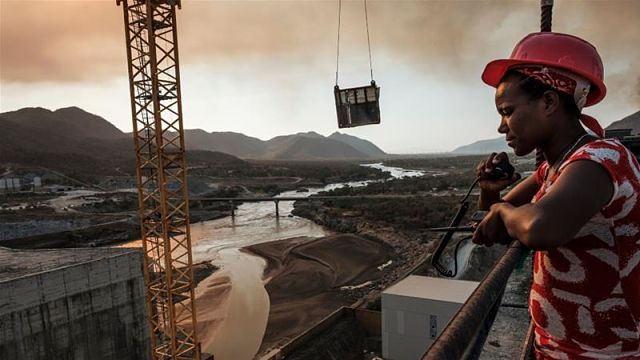
The statement came as new satellite images show the water level in the reservoir behind the nearly completed Grand Ethiopian Renaissance Dam is at its highest in at least four years. (Getty Images)
The Associated Press
Updated: July 21st, 2020
Ethiopia’s prime minister said Tuesday his country, Egypt and Sudan have reached a “major common understanding which paves the way for a breakthrough agreement” on a massive dam project that has led to sharp regional tensions and led some to fear military conflict.
The statement by Abiy Ahmed’s office came as new satellite images show the water level in the reservoir behind the nearly completed $4.6 billion Grand Ethiopian Renaissance Dam is at its highest in at least four years.
Ethiopia has said the rising water is from heavy rains, and the new statement said that “it has become evident over the past two weeks in the rainy season that the (dam’s) first-year filling is achieved and the dam under construction is already overtopping.”
Ethiopia has said it would begin filling the reservoir of the dam, Africa’s largest, this month even without a deal as the rainy season floods the Blue Nile. But the new statement says the three countries’ leaders have agreed to pursue “further technical discussions on the filling … and proceed to a comprehensive agreement.”
The statement did not give details on Tuesday’s discussions, mediated by current African Union chair and South African President Cyril Ramaphosa, or what had been agreed upon.
But the talks among the country’s leaders showed the critical importance placed on finding a way to resolve tensions over the storied Nile River, a lifeline for all involved.
Ethiopia says the colossal dam offers a critical opportunity to pull millions of its nearly 110 million citizens out of poverty and become a major power exporter. Downstream Egypt, which depends on the Nile to supply its farmers and booming population of 100 million with fresh water, asserts that the dam poses an existential threat.
Negotiators have said key questions remain about how much water Ethiopia will release downstream if a multi-year drought occurs and how the countries will resolve any future disputes. Ethiopia rejects binding arbitration at the final stage.
Egyptian President Abdel Fattah el-Sissi stressed Egypt’s “sincere will to continue to achieve progress over the disputed issues,” a spokesman’s statement said. It said the leaders agreed to “give priority to developing a binding legal commitment regarding the basis for filling and operating the dam.”
Sudanese Irrigation Minister Yasser Abbas told reporters in the capital, Khartoum, that once the agreement has been solidified, Ethiopia will retain the right to amend some figures relating to the dam’s operation during drought periods. “Generally, the atmosphere was positive” during the talks, he said.
Abbas said the leaders agreed on Ethiopia’s right to build additional reservoirs and other projects as long as it notifies the downstream countries, in line with international law.
“There are other sticking points, but if we agree on this basic principle, the other points will automatically be solved,” he said.
Both Sudanese Prime Minister Abdalla Hamdok and Ethiopia’s leader called Tuesday’s meeting “fruitful.”
“It is absolutely necessary that Egypt, Sudan and Ethiopia, with the support of the African Union, come to an agreement that preserves the interest of all parties,” Moussa Faki Mahamat, chairman of the AU commission, said on Twitter, adding that the Nile “should remain a source of peace.”
Years of talks with a variety of mediators, including the Trump administration, have failed to produce a solution.
Now satellite images of the reservoir filling are adding fresh urgency. The latest imagery taken Tuesday “certainly shows the highest water levels behind the dam in at least the past four years,” said Stephen Wood, senior director with Maxar News Bureau.
Kevin Wheeler, a researcher at the Environmental Change Institute, University of Oxford, told the AP last week that fears of any immediate water shortage “are not justified at this stage at all and the escalating rhetoric is more due to changing power dynamics in the region.
However, “if there were a drought over the next several years, that certainly could become a risk,” he said.
—
As Seasonal Rains Fall, Dispute over Nile Dam Rushes Toward a Reckoning

Satellite images released this week showed water building up in the reservoir behind the Grand Ethiopian Renaissance Dam. (Photo: Maxar Technologies/EPA, via Shutterstock)
The New York Times
Updated July 18th, 2020
After a decade of construction, the hydroelectric dam in Ethiopia, Africa’s largest, is nearly complete. But there’s still no agreement with Egypt.
CAIRO — Every day now, seasonal rain pounds the lush highlands of northern Ethiopia, sending cascades of water into the Blue Nile, the twisting tributary of perhaps Africa’s most fabled river.
Farther downstream, the water inches up the concrete wall of a towering, $4.5 billion hydroelectric dam across the Nile, the largest in Africa, now moving closer to completion. A moment that Ethiopians have anticipated eagerly for a decade — and which Egyptians have come to dread — has finally arrived.
Satellite images released this week showed water pouring into the reservoir behind the Grand Ethiopian Renaissance Dam — which will be nearly twice as tall as the Statue of Liberty. Ethiopia hopes the project will double its electricity production, bolster its economy, and help unify its people at a time of often-violent divisions.
#FillTheDam read one popular hashtag on Ethiopian social media this week.
Seleshi Bekele, the Ethiopian water minister, rushed to assuage Egyptian anxieties by insisting that the engorging reservoir was the product of natural, entirely predictable seasonal flooding.
He said the formal start of filling, when engineers close the dam gates, has not yet occurred.
Read more »
—
Conflicting Reports Issued Over Ethiopia Filling Mega-dam
Bloomberg
By Samuel Gebre
July 15, 2020
AP cites minister denying that dam’s gates have been closed
Ethiopia began filling the reservoir of its giant Nile dam without signing an agreement on water flows, the state-owned Ethiopian Broadcasting Corp. reported, citing Water, Irrigation and Energy Minister Seleshi Bekele — a step Egypt has warned will threaten regional security.
The minister denied the report, the Associated Press said.
The development comes two days after the latest round of African Union-brokered talks over the Grand Ethiopian Renaissance Dam failed to reach a deal on the pace of filling the 74 billion cubic-meter reservoir. Egypt, which relies on the Nile for almost all its fresh water, has previously described any unilateral filling as a breach of international agreements and has said all options are open in response.
Egypt is asking Ethiopia for urgent and official clarification of the media reports, the Foreign Ministry said in a statement.
Sudan’s irrigation ministry said in a statement that flows on the Nile indicated that Ethiopia had closed the dam’s gate.
Ethiopia, where the 6,000-megawatt power project has become a symbol of national pride, has repeatedly rejected the idea that a deal was needed, even as it took part in talks.
“The inflow into the reservoir is due to heavy rainfall and runoff exceeded the outflow and created natural pooling,” Seleshi said later in Twitter posting, without expressly denying that the filling of the dam had begun. Calls to the ministry’s spokesperson for comment weren’t answered.
The filling of the dam would potentially bring to a head a roughly decade-long dispute between the two countries, both of which are key U.S. allies in Africa and home to about 100 million people. Their mutual neighbor, Sudan, has also been involved in the discussions and echoed Egypt’s misgivings over an impact on water flows.
–
Ethiopia Open to Continue Nile Dam Talks Amid Dispute With Egypt
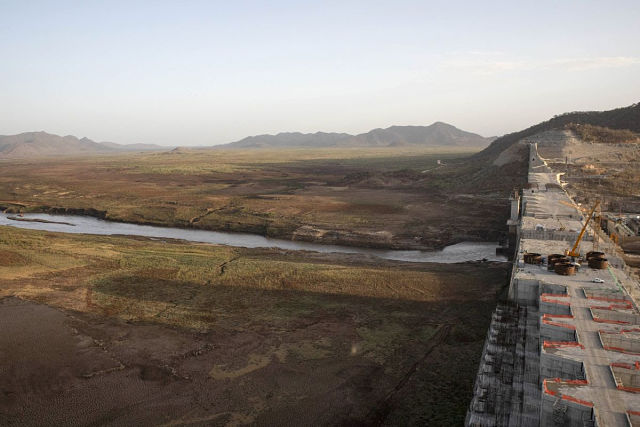
The Blue Nile river flows to the dam wall at the site of the under-construction Grand Ethiopian Renaissance Dam in Ethiopia. (Photographer: Zacharias Abubeker/Bloomberg)
Bloomberg
Updated: July 15, 2020,
Ethiopia pledged to continue talks with Egypt and Sudan on the operation of its 140-meter deep dam on the Nile River’s main tributary, but said demands from downstream nations were thwarting the chances of an agreement.
The three states submitted reports to African Union Chairman and South African President Cyril Ramaphosa after 11 days of negotiations ended on Monday without an agreement. The AU-brokered talks were held amid rising tensions with Ethiopia planning to start filling the reservoir, and Egypt describing any damming without an agreement on water flows as illegal.
“Unchanged stances and additional and excessive demands of Egypt and Sudan prohibited the conclusion of this round of negotiation by an agreement,” Ethiopia’s water and irrigation ministry said Tuesday in a statement. “Ethiopia is committed to show flexibility” to reach a mutually beneficial outcome, it said.
The Nile River is Egypt’s main source of fresh water and it has opposed any development it says willcause significant impact to the flow downstream. Ethiopia, which plans a 6,000 megawatt power plant at the facility, has asserted its right to use the resource.
The two are yet to conclude an agreement over the pace at which Ethiopia fills the 74 billion cubic-meter reservoir, given the potential impact on the amount of water reaching Egypt through Sudan. Ethiopia’s statement didn’t mention anything conclusive on when it plans to start filling the dam.
Egypt’s Foreign Ministry didn’t reply to a request for comment on Tuesday. Foreign Minister Sameh Shoukry told a local TV talk-show on Monday that President Abdel Fattah El-Sisi’s administration seeks to reach an agreement that safeguards the interests of all stakeholders.
Read more »
—
Photos: Satellite Images of GERD Show Water Rising (UPDATE)

The images emerge as Ethiopia, Egypt and Sudan say the latest talks on the contentious project ended Monday with no agreement. Ethiopia has said it would begin filling the reservoir this month even without a deal. But Ethiopian officials did not immediately comment Tuesday on the images. An analyst tells AP that the swelling water is likely due to the rainy season as opposed to official activity. (Photo: Maxar Tech via AP)
The Associated Press
Updated: July 14, 2020,
New satellite imagery shows the reservoir behind Ethiopia’s disputed hydroelectric dam beginning to fill, but an analyst says it’s likely due to seasonal rains instead of government action.
The images emerge as Ethiopia, Egypt and Sudan say the latest talks on the contentious project ended Monday with no agreement. Ethiopia has said it would begin filling the reservoir of the $4.6 billion Grand Ethiopian Renaissance Dam this month even without a deal, which would further escalate tensions.
But the swelling reservoir, captured in imagery on July 9 by the European Space Agency’s Sentinel-1 satellite, is likely a “natural backing-up of water behind the dam” during this rainy season, International Crisis Group analyst William Davison told The Associated Press on Tuesday.
“So far, to my understanding, there has been no official announcement from Ethiopia that all of the pieces of construction that are needed to be completed to close off all of the outlets and to begin impoundment of water into the reservoir” have occurred, Davison said.
But Ethiopia is on schedule for impoundment to begin in mid-July, he added, when the rainy season floods the Blue Nile.
Ethiopian officials did not immediately comment Tuesday on the images.
The latest setback in the three-country talks shrinks hopes that an agreement will be reached before Ethiopia begins filling the reservoir.
Ethiopia says the colossal dam offers a critical opportunity to pull millions of its nearly 110 million citizens out of poverty and become a major power exporter. Downstream Egypt, which depends on the Nile to supply its farmers and booming population of 100 million with fresh water, asserts that the dam poses an existential threat.
Years of talks with a variety of mediators, including the Trump administration, have failed to produce a solution. Last week’s round, mediated by the African Union and observed by U.S. and European officials, proved no different.
Read more and see the photos at apnews.com »
—
PM Abiy Says Unrest Will Not Derail Filling of Nile Dam
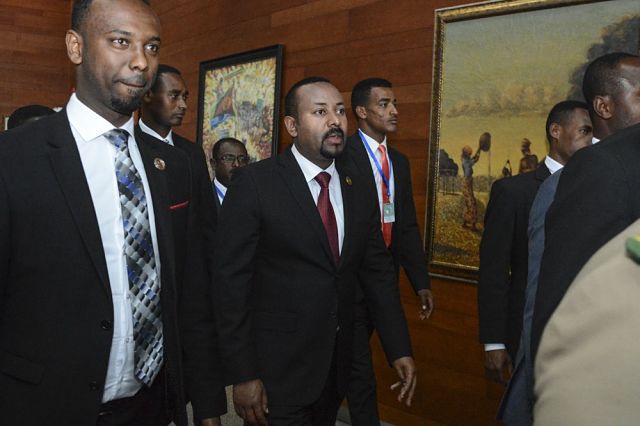
Prime Minister Abiy Ahmed said Tuesday the recent violence was specifically intended to throw Ethiopia’s plans for the Grand Ethiopian Renaissance Dam off course. Abiy, last year’s Nobel Peace Prize winner, also criticised politicians who he suggested were trying to profit from Hachalu’s killing to undermine his government. “You can’t become a government by destroying the country, by sowing ethnic and religious chaos,” he said. (AP photo)
AFP
July 7th, 2020
Addis Ababa (AFP) – Ethiopian Prime Minister Abiy Ahmed said Tuesday that recent domestic unrest would not derail his plan to start filling a mega-dam on the Blue Nile River this month, despite objections from downstream neighbours Egypt and Sudan.
Violence broke out last week in the Ethiopian capital Addis Ababa and the surrounding Oromia region following the shooting death of Hachalu Hundessa, a popular singer from the Oromo ethnic group, Ethiopia’s largest.
More than 160 people died in inter-ethnic killings and in clashes between protesters and security forces, according to the latest official toll provided over the weekend.
Abiy said last week that Hachalu’s killing and the violence that ensued were part of a plot to sow unrest in Ethiopia, without identifying who he thought was involved.
On Tuesday he went a step further, saying it was specifically intended to throw Ethiopia’s plans for the Grand Ethiopian Renaissance Dam off course.
“The desire of the breaking news is to make the Ethiopian government take its eye off the dam,” Abiy said during a question-and-answer session with lawmakers, without giving evidence to support the claim.
Ethiopia sees the Grand Ethiopian Renaissance Dam as essential to its electrification and development, while Egypt and Sudan worry it will restrict access to vital Nile waters.
Addis Ababa has long intended to begin filling the dam’s reservoir this month — in the middle of its rainy season — while Cairo and Khartoum are pushing for the three countries to first reach an agreement on how it will be operated.
Talks between the three nations resumed last week.
Ethiopian officials have not publicised the exact day they intend to start filling the dam.
But Abiy on Tuesday reiterated Ethiopia’s position that the filling process is an essential element of the dam’s construction.
“If Ethiopia doesn’t fill the dam, it means Ethiopia has agreed to demolish the dam,” he said.
“On other points we can reach an agreement slowly over time, but for the filling of the dam we can reach and sign an agreement this year.”
-Ethiopia ‘not Syria, Libya’-
Abiy, last year’s Nobel Peace Prize winner, also criticised politicians who he suggested were trying to profit from Hachalu’s killing to undermine his government.
“You can’t become a government by destroying a government by destroying the country, by sowing ethnic and religious chaos,” he said.
“If Ethiopia becomes Syria, if Ethiopia becomes Libya, the loss is for everybody.”
A number of high-profile opposition politicians have been arrested in Ethiopia in the wake of Hachalu’s killing.
Some of them, including former media mogul Jawar Mohammed, have accused Abiy, the country’s first Oromo prime minister, of failing to sufficiently champion Oromo interests after years of anti-government protests swept him to power in 2018.
Abiy defended his Oromo credentials on Tuesday. “All my life I’ve struggled for the Oromo people,” he said.
“The Oromo people are free now. What we need now is development.”
—
‘It’s my dam’: Ethiopians Unite Around Nile River Mega-Project

The Blue Nile flowing through the Grand Ethiopian Renaissance Dam. The project is passionately supported by the Ethiopian public despite the tensions it has stoked with Egypt and Sudan downstream. (AFP)
AFP
Updated: June 29th, 2020
Last week, Ethiopian Prime Minister Abiy Ahmed’s press secretary took a break from official statements to post something different to her Twitter feed: a 37-line poem defending her country’s massive dam on the Blue Nile River.
“My mothers seek respite/From years of abject poverty/Their sons a bright future/And the right to pursue prosperity,” Billene Seyoum wrote in her poem, entitled “Ethiopia Speaks”.
As the lines indicate, Ethiopia sees the $4.6 billion (four-billion-euro) Grand Ethiopian Renaissance Dam as crucial for its electrification and development.
But the project, set to become Africa’s largest hydroelectric installation, has sparked an intensifying row with downstream neighbours Egypt and Sudan, which worry that it will restrict vital water supplies.
Addis Ababa plans to start filling next month, despite demands from Cairo and Khartoum for a deal on the dam’s operations to avoid depletion of the Nile.
The African Union is assuming a leading role in talks to resolve outstanding legal and technical issues, and the UN Security Council could take up the issue Monday.
With global attention to the dam on the rise, its defenders are finding creative ways to show support — in verse, in Billene’s case, through other art forms and, most commonly, in social media posts demanding the government finish construction.
To some observers, the dam offers a rare point of unity in an ethnically-diverse country undergoing a fraught democratic transition and awaiting elections delayed by the coronavirus pandemic.
Abebe Yirga, a university lecturer and expert in water management, compared the effort to finish the dam to Ethiopia’s fight against Italian would-be colonisers in the late 19th century.
“During that time, Ethiopians irrespective of religion and different backgrounds came together to fight against the colonial power,” he said.
“Now, in the 21st century, the dam is reuniting Ethiopians who have been politically and ethnically divided.”
-Hashtag activism-
Ethiopia broke ground on the dam in 2011 under then-Prime Minister Meles Zenawi, who pitched it as a catalyst for poverty eradication.
Civil servants contributed one month’s salary towards the project that year, and the government has since issued dam bonds targeting Ethiopians at home and abroad.
Nearly a decade later, the dam remains a source of hope for a country where more than half the population of 110 million lives without electricity.
With Meles dead nearly eight years, perhaps the most prominent face of the project these days is water minister Seleshi Bekele, a former academic whose publications include articles with titles like “Estimation of flow in ungauged catchments by coupling a hydrological model and neural networks: Case study”.
As a government minister, though, Seleshi has demonstrated an ear for the catchy soundbite.
At a January press conference in Addis Ababa, he fielded a question from a journalist wondering whether countries besides Ethiopia might play a role in operating the dam.
With an amused expression on his face, Seleshi looked the journalist dead in the eye and responded simply, “It’s my dam.”
In those five seconds, a hashtag was born.
Coverage of the exchange went viral, and today a Twitter search for #ItsMyDam turns up seemingly endless posts hailing the project.
At recent events officials have even distributed T-shirts bearing the slogan to Ethiopian journalists, who proudly wear them around town.
-Banana boosterism-
Some non-Ethiopians have also gotten in on #ItsMyDam fever.
Anna Chojnicka spent four years living in Ethiopia working for an organisation supporting social entrepreneurs, though she recently moved to London.
In March, holed up with suspected COVID-19, she began using a comb and thread-cutter to imprint designs on bananas.
Her #BananaOfTheDay series has included bruises portraying the London skyline, iconic scenes from Disney movies and the late singer Amy Winehouse.
But by far the most popular are her bananas related to the dam, the first of which she posted last week showing water rushing through the concrete colossus.
On Thursday she posted a banana featuring a woman carrying firewood, noting that once the dam starts operating “fewer women will need to collect firewood for fuel”.
The image was quickly picked up by an Ethiopian television station.
—
Ethiopia, Egypt & Sudan Agree to Restart Talks Over Disputed Dam

Early Saturday, Seleshi Bekele, Ethiopia’s water and energy minister, confirmed that the countries had decided during an African Union summit to restart stalled negotiations and finalize an agreement over the contentious mega-project within two to three weeks, with support from the AU. (Satellite image via AP)
The Associated Press
Updated: June 27th, 2020
The leaders of Egypt, Sudan and Ethiopia agreed late Friday to return to talks aimed at reaching an accord over the filling of Ethiopia’s new hydroelectric dam on the Blue Nile, according to statements from the three nations.
Early Saturday, Seleshi Bekele, Ethiopia’s water and energy minister, confirmed that the countries had decided during an African Union summit to restart stalled negotiations and finalize an agreement over the contentious mega-project within two to three weeks, with support from the AU.
The announcement was a modest reprieve from weeks of bellicose rhetoric and escalating tensions over the $4.6 billion Grand Ethiopian Renaissance Dam, which Ethiopia had vowed to start filling at the start of the rainy season in July.
Egypt and Sudan said Ethiopia would refrain from filling the dam next month until the countries reached a deal. Ethiopia did not comment explicitly on the start of the filling period.
Ethiopia has hinged its development ambitions on the colossal dam, describing it as a crucial lifeline to bring millions out of poverty.
Egypt, which relies on the Nile for more than 90% of its water supplies and already faces high water stress, fears a devastating impact on its booming population of 100 million. Sudan, which also depends on the Nile for water, has played a key role in bringing the two sides together after the collapse of U.S.-mediated talks in February.
Just last week, Ethiopian Foreign Minister Gedu Andargachew warned that his country could begin filling the dam’s reservoir unilaterally, after the latest round of talks with Egypt and Sudan failed to reach an accord governing how the dam will be filled and operated.
After an AU video conference chaired by South Africa late Friday, Egyptian President Abdel Fattah el-Sissi said that “all parties” had pledged not to take “any unilateral action” by filling the dam without a final agreement, said Bassam Radi, Egypt’s presidency spokesman.
Sudanese Prime Minister Abdalla Hamdok also indicated the impasse between the Nile basin countries had eased, saying the nations had agreed to restart negotiations through a technical committee with the aim of finalizing a deal in two weeks. Ethiopia won’t fill the dam before inking the much-anticipated deal, Hamdok’s statement added.
African Union Commission Chairman Moussa Faki Mahamat said the countries “agreed to an AU-led process to resolve outstanding issues,” without elaborating.
Sticking points in the talks have been how much water Ethiopia will release downstream from the dam if a multi-year drought occurs and how Ethiopia, Egypt and Sudan will resolve any future disagreements.
Both Egypt and Sudan have appealed to the U.N. Security Council to intervene in the years-long dispute and help the countries avert a crisis. The council is set to hold a public meeting on the issue Monday.
Filling the dam without an agreement could bring the stand-off to a critical juncture. Both Egypt and Ethiopia have hinted at military steps to protect their interests, and experts fear a breakdown in talks could lead to open conflict.
—
Related:
Egypt, Ethiopia and Sudan to agree Nile dam in weeks
Ethiopia agrees to delay filling Nile mega-dam, say Egypt, Sudan
Clock Ticks On Push to Resolve Egypt-Ethiopia Row Over Nile Dam

The Grand Renaissance Dam is seen as it undergoes construction on the river Nile in Guba Woreda, Benishangul Gumuz Region, Ethiopia. (REUTERS photo/Tiksa Negeri)
Reuters
Updated: June 26th, 2020
CAIRO (Reuters) – Egypt is counting on international pressure to unlock a deal it sees as crucial to protecting its scarce water supplies from the Nile river before the expected start-up of a giant dam upstream in Ethiopia in July.
Tortuous, often acrimonious negotiations spanning close to a decade have left the two nations and their neighbour Sudan short of an agreement to regulate how Ethiopia will operate the dam and fill its reservoir.
Though Egypt is unlikely to face any immediate, critical shortages from the dam even without a deal, failure to reach one before the filling process starts could further poison ties and drag out the dispute for years, analysts say.
“There is the threat of worsening relations between Ethiopia and the two downstream countries, and consequently increased regional instability,” said William Davison, a senior analyst at the International Crisis Group.
The latest round of talks left the three countries “closer than ever to reaching an agreement”, according to a report by Sudan’s foreign ministry seen by Reuters.
But it also said the talks, which were suspended last week, had revealed a “widening gap” over the key issue of whether any agreement would be legally binding, as Egypt demands.
The stakes for largely arid Egypt are high, for it draws at least 90% of its fresh water from the Nile.
With Ethiopia insisting it will use seasonal rains to begin filling the dam’s reservoir next month, Cairo has appealed to the U.N. Security Council in a last-ditch diplomatic move.
ECONOMIC DEVELOPMENT
The Grand Ethiopian Renaissance Dam (GERD) is being built about 15 km (nine miles) from the border with Sudan on the Blue Nile, the source of most of the Nile’s waters.
Ethiopia says the $4 billion hydropower project, which will have an installed capacity of 6,450 megawatts, is essential to its economic development. Addis Ababa told the U.N. Security Council in a letter this week that it is “designed to help extricate our people from abject poverty”.
The letter repeated accusations that Egypt was trying to maintain historic advantages over the Nile and constrict Ethiopia’s pursuit of future upstream projects. It argued that Ethiopia had accommodated Egyptian demands to allow recent talks to move forward before Egypt unnecessarily escalated by taking the issue to the Security Council.
Ethiopia’s government was not immediately available for comment.
Egypt says it is focused on securing a fair deal limited to the GERD, and that Ethiopia’s talk of righting colonial-era injustice is a ruse meant to distract attention from a bid to impose a fait accompli on its downstream neighbours.
Both accuse each other of trying to sabotage the talks and of blocking independent studies on the impact of the GERD. Egypt requested U.S. mediation last year, leading to talks over four months in Washington that broke down in February.
“PROGRESS”
The resort to outside mediation came because the two sides had been “going round in vicious cycles for years”, said an Egyptian official. The stand-off is a chance for the international community to show leadership on the issue of water, and help broker a deal that “could unlock a lot of cooperation possibilities”, he said.
Talks this month between water ministers led by Sudan, and observed by the United States, South Africa and the European Union, produced a draft deal that Sudan said made “significant progress on major technical issues”.
It listed outstanding technical issues however, including how the dam would operate during “dry years” of reduced rainfall, as well as legal issues on whether the agreement and its mechanism for resolving disputes should be binding.
Sudan, for its part, sees benefits from the dam in regulating its Blue Nile waters, but wants guarantees it will be safely and properly operated.
Like Egypt it is seeking a binding deal before filling starts, but its increasing alignment with Cairo has not proved decisive.
Technical compromises are still available, said Davison, but “there’s no reason to think that Ethiopia is going to bow to increased international pressure”.
“We need to move away from diplomatic escalation and instead the parties need to sit themselves once again around the table and stay there until they reach agreement.”
—
UN to Hear Ethiopia-Egypt Nile Dam Dispute
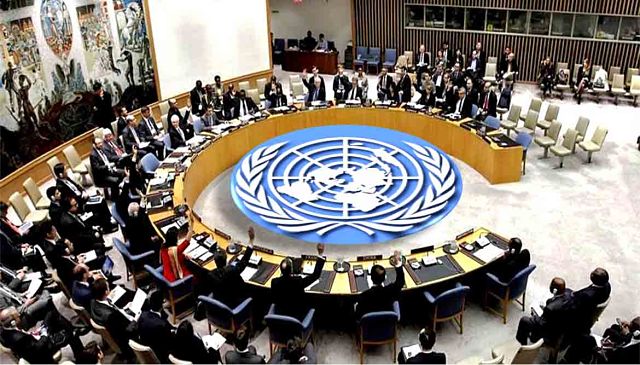
The behind-closed-doors meeting [set for Monday in New York] was requested by France, according to diplomats, who spoke on condition of anonymity. It came after the latest talks between Egypt, Ethiopia and Sudan ended without an agreement. (Bloomberg)
Bloomberg
(Bloomberg) — The United Nations Security Council will discuss for the first time Monday a growing dispute between Egypt and Ethiopia over a giant hydropower dam being built on the Nile River’s main tributary, diplomats said. The behind-closed-doors meeting was requested by France, according to the diplomats, who spoke on condition of anonymity. It came after the latest talks between Egypt, Ethi
The behind-closed-doors meeting was requested by France, according to the diplomats, who spoke on condition of anonymity. It came after the latest talks between Egypt, Ethiopia and mutual neighbor Sudan ended last week with Ethiopia refusing to accept a permanent, minimum volume of water that the Grand Ethiopian Renaissance Dam should release downstream in the event of severe drought.
Egypt’s Foreign Ministry subsequently asked the UNSC to intervene, calling for a fair and balanced solution. Ethiopia has threatened to start filling the dam’s reservoir when the rainy season begins in July, with or without a deal. That’s a step that Egypt, which relies on the Nile for almost all its fresh water, considers both unacceptable and illegal.
Ethiopia remains resolute that a so-called declaration of principles agreement signed by Egypt, Ethiopia and Sudan in 2015 allows it to proceed with damming the GERD.
—
Dear Ethiopia & Egypt: Nile Dam Update
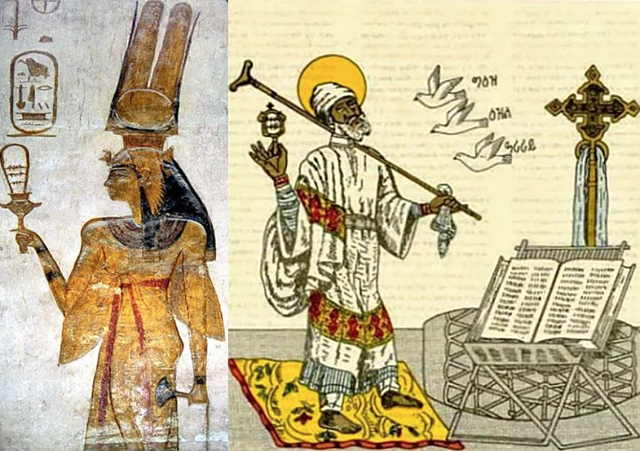
Nefartari with Simbel and St. Yared holding a Simbel, which is called Tsenatsil in Amharic and Ge’ez.
The Africa Report
By Meklit Berihun, a civil engineer and aspiring researcher in systems thinking and its application in the water/environment sector.

Dear Egypt
My dear, how are you holding up in these trying times? I hope you are faring well as much as one can given the circumstances. And I pray we will not be burdened with more than we can bear and that this time will soon come to pass for the both of us.
Dearest, I hear of your frustration about the progress—or lack thereof—on the negotiations over my dam. That is a frustration I also share. I look forward to the day we settle things and look to the future together.
Beloved, though your approach has recently metamorphosed in addressing your right to our water—officially stating you never held on to any past agreements—the foundation, that you do not want to settle for anything less than 66 percent of what is shared by 10 of your fellow African states, remains unchanged. I must be honest: I cannot fathom how you still hold on to this.
Read more »
—
Dear Ethiopia,
By Nervana Mahmoud, Doctor and independent political commentator on Middle East issues. BBC’s 100 women 2013.

Thank you for your letter.
The fate of our two countries has been linked since ancient times, as described in Herodotus’s book An Account of Egypt, Egypt is the “gift of the Nile,” “it has soil which is black and easily breaks up, seeing that it is in truth mud and silt brought down from Ethiopia by the river.”
It is sad you question Egypt’s African identity. It may sound surprising to you, but the vast majority of Egyptians are proud Africans. In 1990, my entire family was glued to the television, showing our support for Cameroon against England, in the World Cup. Last year, Egypt hosted the 2019 Africa Cup of Nations. Many Egyptians supported Senegal and Nigeria, who played Arab teams, in the final rounds because we see ourselves as Africans.
Unfortunately, I do not believe that you — our African brothers — appreciate the potential disastrous impacts of your Grand Renaissance Dam (GERD) on our livelihood in Egypt.
Read more »
—
AP Interview: Egypt Says UN Must Stop Ethiopia on Dam Fill
AP Interview:: Ethiopia To Fill Disputed Dam, Deal or No Deal

This satellite image taken May 28, 2020, shows the Grand Ethiopian Renaissance Dam (GERD) on the Blue Nile river in the Benishangul-Gumuz region. In an interview with The Associated Press Friday, June 19, 2020, Foreign Minister Gedu Andargachew said that Ethiopia will start filling the $4.6 billion dam next month. (AP)
The Associated Press
By ELIAS MESERET
Updated: June 19th, 2020
ADDIS ABABA, Ethiopia (AP) — It’s a clash over water usage that Egypt calls an existential threat and Ethiopia calls a lifeline for millions out of poverty. Just weeks remain before the filling of Africa’s most powerful hydroelectric dam might begin, and tense talks between the countries on its operation have yet to reach a deal.
In an interview with The Associated Press, Ethiopian Foreign Minister Gedu Andargachew on Friday declared that his country will go ahead and start filling the $4.6 billion Grand Ethiopian Renaissance Dam next month, even without an agreement. “For us it is not mandatory to reach an agreement before starting filling the dam, hence we will commence the filling process in the coming rainy season,” he said.
“We are working hard to reach a deal, but still we will go ahead with our schedule whatever the outcome is. If we have to wait for others’ blessing, then the dam may remain idle for years, which we won’t allow to happen,” he said. He added that “we want to make it clear that Ethiopia will not beg Egypt and Sudan to use its own water resource for its development,” pointing out that Ethiopia is paying for the dam’s construction itself.
He spoke after the latest round of talks with Egypt and Sudan on the dam, the first since discussions broke down in February, failed to reach agreement.
No date has been set for talks to resume, and the foreign minister said Ethiopia doesn’t believe it’s time to take them to a head of state level.
The years-long dispute pits Ethiopia’s desire to become a major power exporter and development engine against Egypt’s concern that the dam will significantly curtail its water supply if filled too quickly. Sudan has long been caught between the competing interests.
The arrival of the rainy season is bringing more water to the Blue Nile, the main branch of the Nile, and Ethiopia sees an ideal time to begin filling the dam’s reservoir next month.
Both Egypt and Ethiopia have hinted at military steps to protect their interests, and experts fear a breakdown in talks could lead to conflict.
Ethiopia’s foreign minister would not say whether his country would use military action to defend the dam and its operations.
“This dam should have been a reason for cooperation and regional integration, not a cause for controversies and warmongering,” he said. “Egyptians are exaggerating their propaganda on the dam issue and playing a political gamble. Some of them seem as if they are longing for a war to break out.”
Gedu added: “Our reading is that the Egyptian side wants to dictate and control even future developments on our river. We won’t ask for permission to carry out development projects on our own water resources. This is both legally and morally unacceptable.”
He said Ethiopia has offered to fill the dam in four to seven years, taking possible low rainfall into account.
Sticking points in the talks have been how much water Ethiopia will release downstream from the dam during a multi-year drought and how Ethiopia, Egypt and Sudan will resolve any future disputes.
The United States earlier this year tried to broker a deal, but Ethiopia did not attend the signing meeting and accused the Trump administration of siding with Egypt. This week some Ethiopians felt vindicated when the U.S. National Security Council tweeted that “257 million people in east Africa are relying on Ethiopia to show strong leadership, which means striking a fair deal.”
In reply to that, Ethiopia’s foreign minister said: “Statements issued from governments and other institutions on the dam should be crafted carefully not to take sides and impair the fragile talks, especially at this delicate time. They should issue fair statements or just issue no statements at all.”
He also rejected the idea that the issue should be taken to the United Nations Security Council, as Egypt wants. Egypt’s foreign ministry issued a statement Friday saying Egypt has urged the Security Council to intervene in the dispute to help the parties reach a “fair and balanced solution” and prevent Ethiopia from “taking any unilateral actions.”
The latest talks saw officials from the U.S., European Union and South Africa, the current chairman of the African Union, attending as observers.
Sudan’s Irrigation Minister Yasser Abbas told reporters after talks ended Wednesday that the three counties’ irrigation leaders have agreed on “90% or 95%” of the technical issues but the dispute over the “legal points” in the deal remains dissolved.
The Sudanese minister said his country and Egypt rejected Ethiopia’s attempts to include articles on water sharing and old Nile treaties in the dam deal. Egypt has received the lion’s share of the Nile’s waters under decades-old agreements dating back to the British colonial era. Eighty-five percent of the Nile’s waters originate in Ethiopia from the Blue Nile.
“The Egyptians want us to offer a lot, but they are not ready to offer us anything,” Gedu said Friday. “They want to control everything. We are not discussing a water-sharing agreement.”
The countries should not get stuck in a debate about historic water rights, William Davison, senior analyst on Ethiopia with the International Crisis Group, told reporters this week. “During a period of filling, yes, there’s reduced water downstream. But that’s a temporary period,” he said.
Initial power generation from the dam could be seen late this year or in early 2021, he said.
Ethiopia’ foreign minister expressed disappointment in Egypt’s efforts to find backing for its side.
“Our African brotherly countries should have supported us, but instead they are tainting our country’s name around the world, and especially in the Arab world,” he said. “Egypt’s monopolistic approach to the dam issue will not be acceptable for us forever.”
—
Tussle for Nile Control Escalates as Dam Talks Falter

The Blue Nile river passes through the Grand Ethiopian Renaissance Dam near Guba, Ethiopia. (Getty Images)
Bloomberg
Updated: June 18th, 2020
A last ditch attempt to resolve a decade-long dispute between Egypt and Ethiopia over a huge new hydropower dam on the Nile has failed, raising the stakes in what – for all the public focus on technical issues – is a tussle for control over the region’s most important water source.
The talks appear to have faltered over a recurring issue: Ethiopia’s refusal to accept a permanent, minimum volume of water that the Grand Ethiopian Renaissance Dam, or GERD, should release downstream in the event of severe drought.
What happens next remains uncertain. Both Ethiopia and Sudan – a mutual neighbor that took part in the talks – said that progress had been made and left the door open to further negotiation. Yet the stakes in a region acutely vulnerable to the impact of climate change are disconcertingly clear.
Ethiopia has threatened to start filling the dam’s reservoir when the rainy season begins in July, with or without a deal, a step Egypt considers both unacceptable and illegal. In a statement late Wednesday, Egypt’s irrigation ministry accused Ethiopia of refusing to accept any effective drought provision or legally binding commitments, or even to refer the talks to the three prime ministers in an effort to break the deadlock. Ethiopia was demanding “an absolute right” to build further dams behind the GERD, the ministry said.
Egypt’s Foreign Minister Sameh Shoukry threatened on Monday to call for United Nations Security Council intervention to protect “international peace and security” if no agreement was reached. A day later his Ethiopian opposite, Gedu Andargachew, accused Egypt of “acting as if it is the sole owner of the Nile waters.”
Egyptian billionaire Naguib Sawiris even warned of a water war. “We will never allow any country to starve us, if Ethiopia doesn’t come to reason, we the Egyptian people will be the first to call for war,” he said in a tweet earlier this week.
Although both sides have played down the prospect of military conflict, they have occasionally rattled sabers and concern at the potential for escalation helped draw the U.S. and World Bank into the negotiating process last year. When that attempt floundered in February, the European Union and South Africa, as chair of the African Union, joined in.
“This is all about control,” said Asfaw Beyene, a professor of mechanical engineering at San Diego State University, California, whose work Egypt cited in support of a May 1 report to the UN. The so-called aide memoire argued that the GERD and its 74 billion cubic meter reservoir are so vastly oversized relative to the power they will produce that it “raises questions about the true purpose of the dam.”
National Survival
Egypt’s concern is that once the dam’s sluices can control the Nile’s flow, Ethiopia could in times of drought say “I am not releasing water, I need it,” or dictate how the water released is used, says Asfaw. Yet he backs Ethiopia’s claims that once filled, the dam won’t significantly affect downstream supplies. He also agrees with their argument that climate change could render unsustainable any water guarantees given to Egypt.
Both sides describe the future of the hydropower dam that will generate as much as 15.7 gigawatts of electricity per year as a matter of national survival. Egypt relies on the Nile for as much as 97% of an already strained water supply. Ethiopia says the dam is vital for development, because it would increase the nation’s power generation by about 150% at a time when more than half the population have no access to electricity.
Read more »
—
UPDATE: Ethiopian Army Official Says Country Will Defend Itself Over Dam (AP)

A general view of the Blue Nile river as it passes through the Grand Ethiopian Renaissance Dam (GERD), near Guba in Ethiopia. (Getty Images)
The Associated Press
By ELIAS MESERET
Updated: June 12th, 2020
ADDIS ABABA, Ethiopia (AP) — Ethiopia’s deputy army chief on Friday said his country will strongly defend itself and will not negotiate its sovereignty over the disputed $4.6 billion Nile dam that has caused tensions with Egypt.
“Egyptians and the rest of the world know too well how we conduct war whenever it comes,” Gen. Birhanu Jula said in an interview with the state-owned Addis Zemen newspaper, adding that Egyptian leaders’ “distorted narrative” on Africa’s largest hydroelectric dam is attracting enemies.
He accused Egypt of using its weapons to “threaten and tell other countries not to touch the shared water” and said “the way forward should be cooperation in a fair manner.”
He spoke amid renewed talks among Ethiopian, Sudanese and Egyptian water and irrigation ministers after months of deadlock. Ethiopia wants to begin filling the dam’s reservoir in the coming weeks, but Egypt worries a rapid filling will take too much of the water it says its people need to survive. Sudan, caught between the competing interests, pushed the two sides to resume discussions.
The general’s comments were a stark contrast to Ethiopian Prime Minister Abiy Ahmed’s remarks to lawmakers earlier this week that diplomacy should take center stage to resolve outstanding issues.
“We don’t want to hurt anyone else, and at the same time it will be difficult for us to accept the notion that we don’t deserve to have electricity,” the Nobel Peace Prize laureate said. “We are tired of begging others while 70% of our population is young. This has to change.”
Talks on the dam have struggled. Egypt’s Irrigation Ministry on Wednesday called for Ethiopia to “clearly declare that it had no intention of unilaterally filling the reservoir” and that a deal prepared by the U.S. and the World Bank in February serves as the starting point of the resumed negotiations.
Ethiopia refused to sign that deal and accused the U.S. of siding with Egypt.
Egypt said that in Tuesday’s talks, Ethiopia showed it wanted to re-discuss “all issues” including “all timetables and figures” negotiated in the U.S.-brokered talks.
President Abdel-Fattah el-Sissi discussed the latest negotiations in a phone call with President Donald Trump on Wednesday, el-Sissi’s office said, without elaborating.
Egypt’s National Security Council, the highest body that makes decisions in high-profile security matters in the country, has accused Ethiopia of “buying time” and seeking to begin filling the dam’s reservoir in July without reaching a deal with Egypt and Sudan.
—
Ethiopia Seeks to Limit Outsiders’ Role in Nile Dam Talks (AFP)

Ethiopia sees the dam as essential for its electrification and development, while Sudan and Egypt see it as a threat to essential water supplies (AFP Photo)
AFP
Updated: June 11th, 2020
Addis Ababa (AFP) – Ethiopia said Thursday it wants to limit the role of outside parties in revived talks over its Nile River mega-dam, a sign of lingering frustration over a failed attempt by the US to broker a deal earlier this year.
The Grand Ethiopia Renaissance Dam has been a source of tension in the Nile River basin ever since Ethiopia broke ground on it nearly a decade ago.
Ethiopia sees the dam as essential for its electrification and development, while Sudan and Egypt see it as a threat to essential water supplies.
The US Treasury Department stepped in last year after Egyptian President Abdel Fattah al-Sisi put in a request to his ally US President Donald Trump.
But the process ran aground after the Treasury Department urged Ethiopia to sign a deal that Egypt backed as “fair and balanced”.
Ethiopia denied a deal had been reached and accused Washington of being “undiplomatic” and playing favourites.
On Tuesday Ethiopia, Egypt and Sudan resumed talks via videoconference with representatives of the United States, the European Union and South Africa taking part.
The talks resumed Wednesday and were expected to pick up again Thursday.
In a statement aired Thursday by state-affiliated media, Ethiopia’s water ministry said the role of the outside parties should not “exceed that of observing the negotiation and sharing good practices when jointly requested by the three countries.”
The statement also criticised Egypt for detailing its grievances over the dam in a May letter to the UN Security Council — a move it described as a bad faith attempt to “exert external diplomatic pressure”.
Ethiopian Prime Minister Abiy Ahmed reiterated Monday that his country plans to begin filling the dam’s reservoir in the coming weeks, giving the latest talks heightened urgency.
The short window makes it “more necessary than ever that concessions are made so a deal can be struck that will ease potentially dangerous tensions,” said William Davison of the International Crisis Group, a conflict prevention organisation.
One solution could involve Ethiopia “proposing a detailed cooperative annual drought-management scheme that takes Egypt and Sudan’s concerns into account, but does not unacceptably constrain the dam’s potential,” he said.
The EU sees the resumption of talks as “an important opportunity to restore confidence among the parties, build on the good progress achieved and agree on a mutually beneficial solution,” said spokeswoman Virginie Battu-Henriksson.
“Especially in this time of global crisis, it is important to appease tensions and find pragmatic solutions,” she said.
—
Join the conversation on Twitter and Facebook.
 Top left: Lisa Simpson becomes the first female U.S. president in a 2000 episode. Right: The Simpsons discover delicious food in Little Ethiopia after their car breaks down. (Photo: The Simpsons™)
Top left: Lisa Simpson becomes the first female U.S. president in a 2000 episode. Right: The Simpsons discover delicious food in Little Ethiopia after their car breaks down. (Photo: The Simpsons™)






